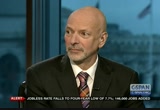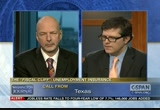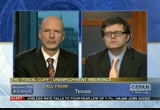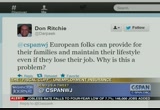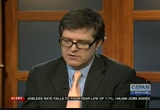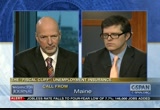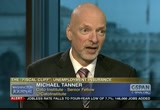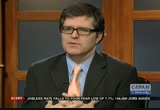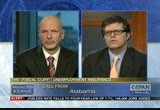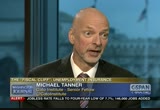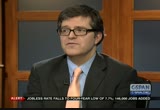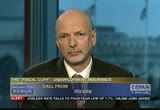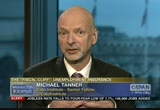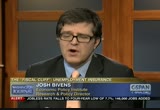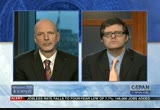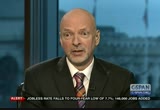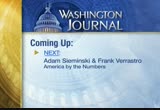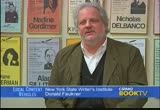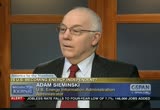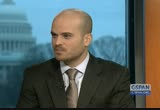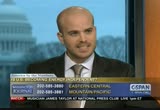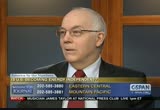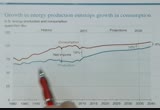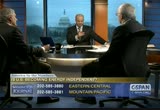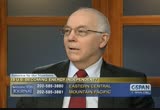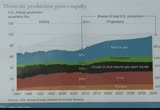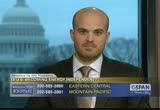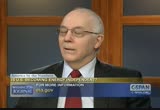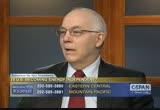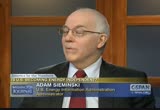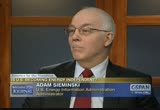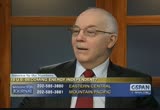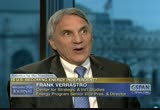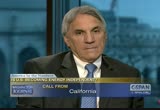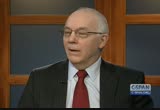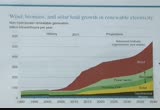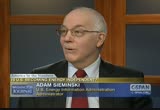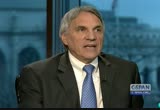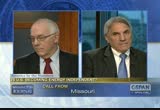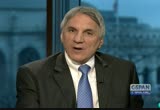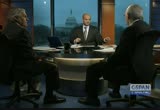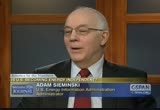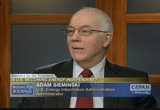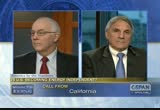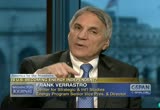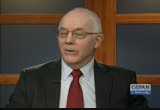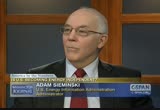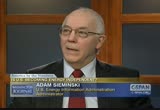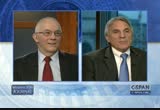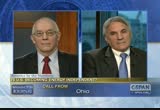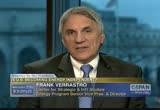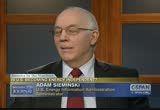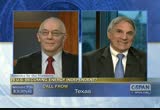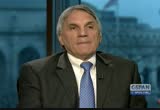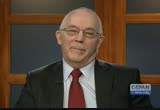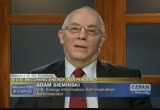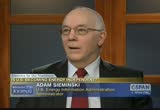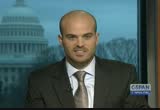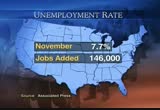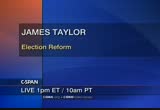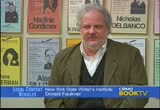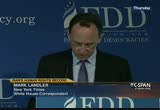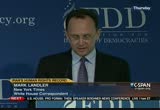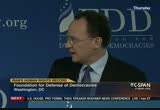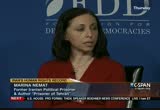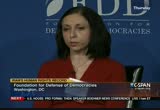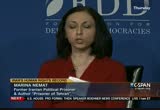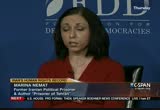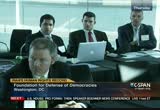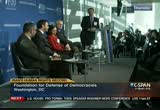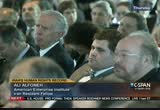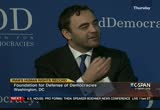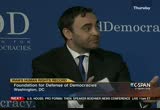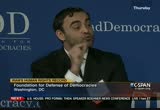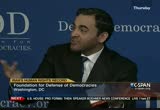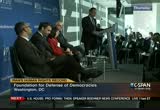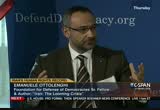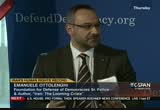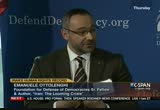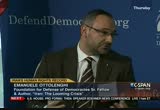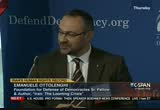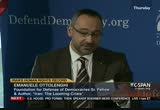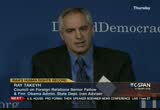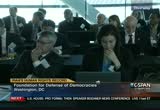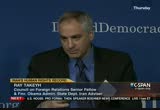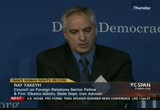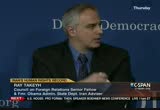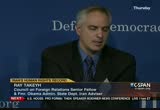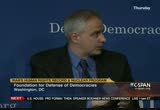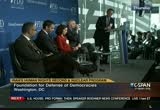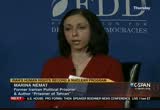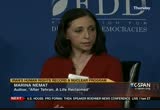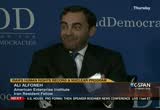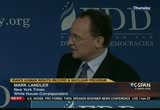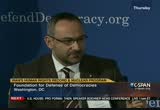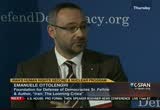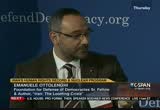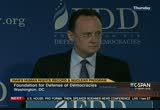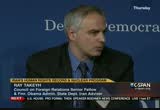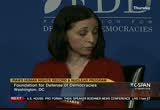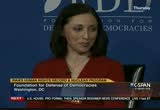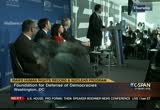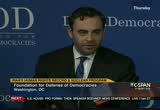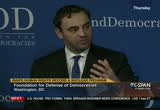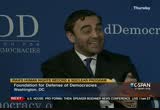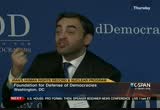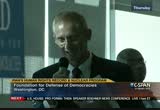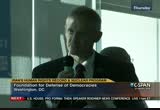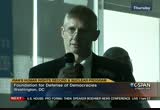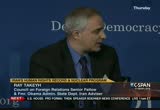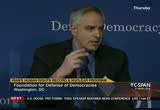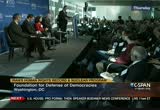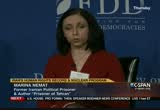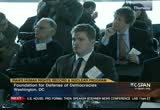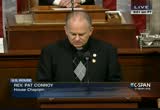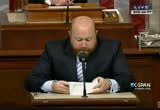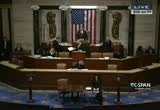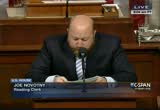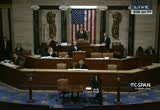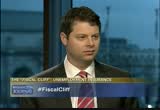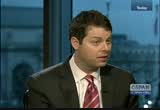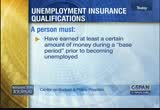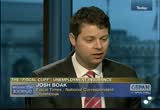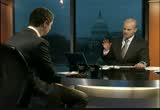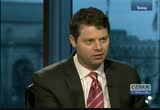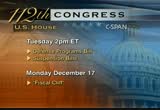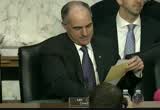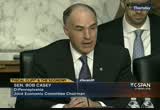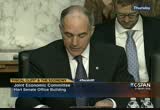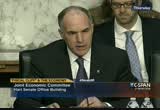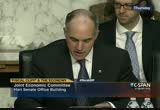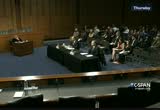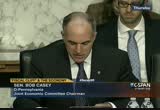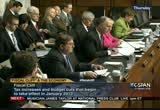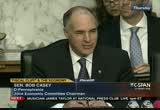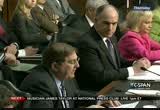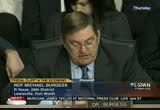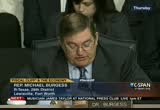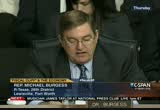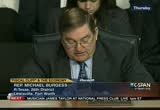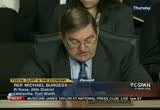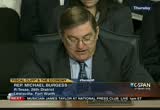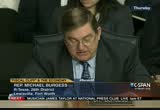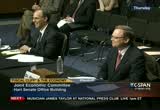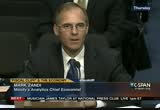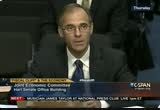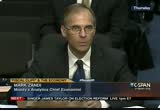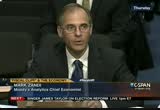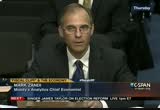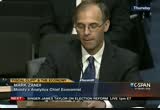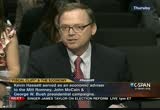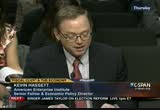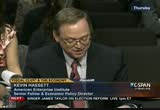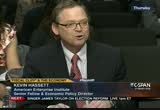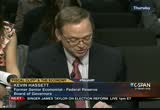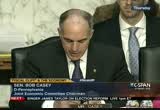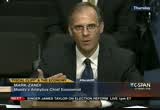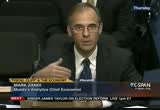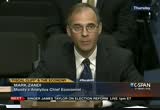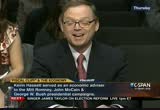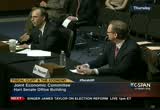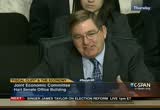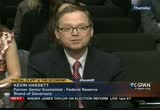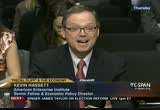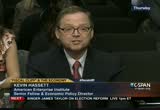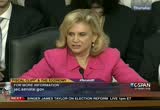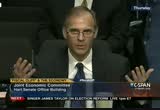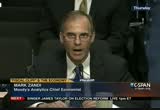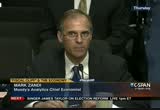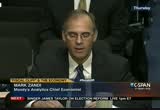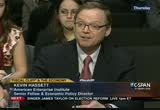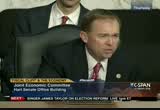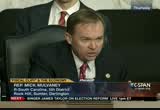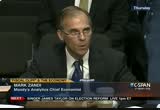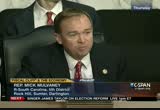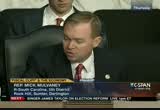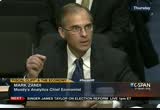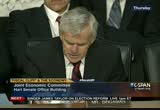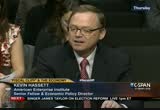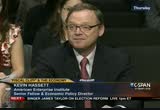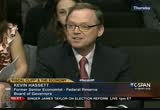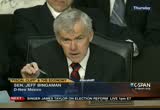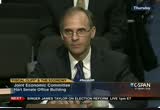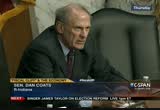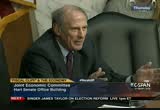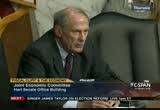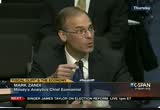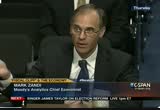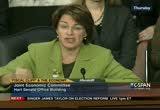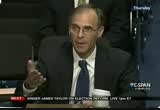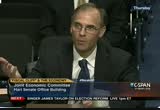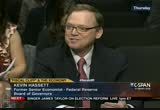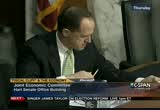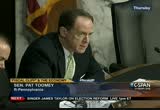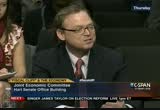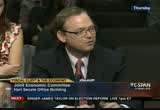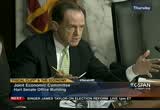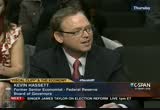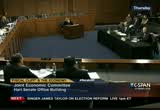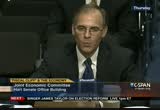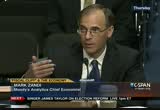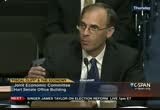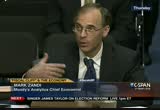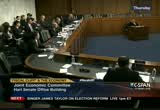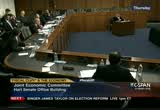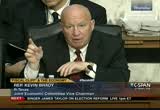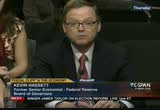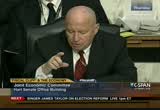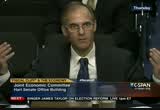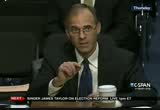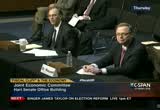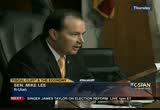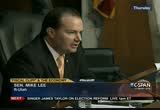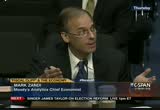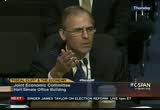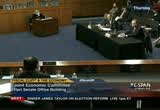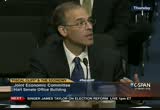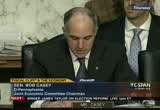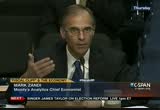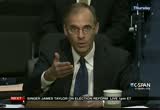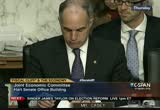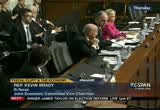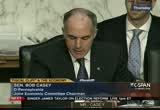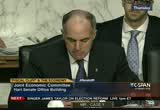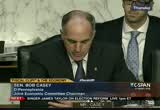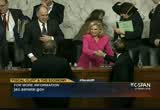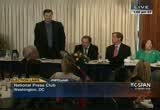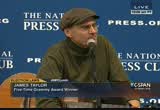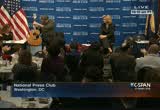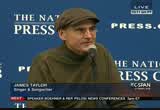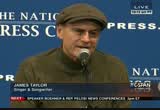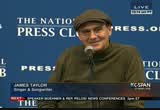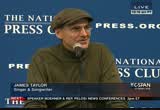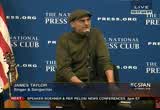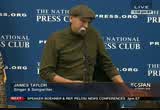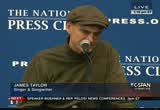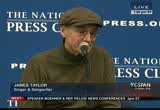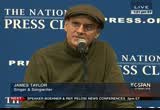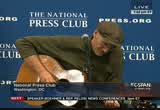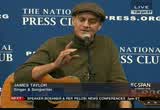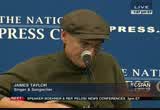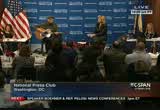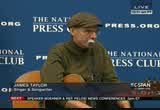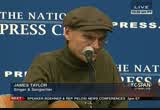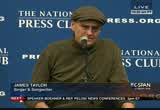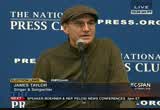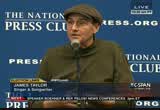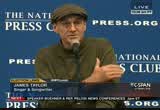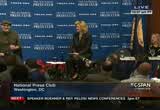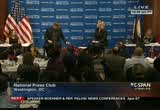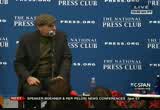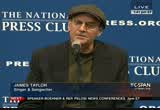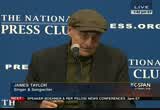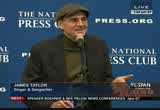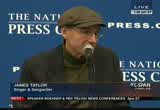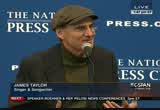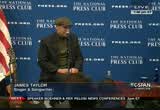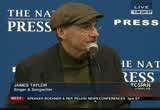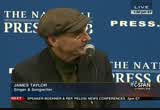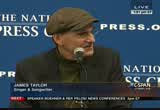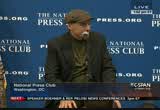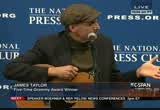tv Public Affairs CSPAN December 7, 2012 9:00am-2:00pm EST
9:00 am
economic crisis that has existed there over many decades. guest: two things there. it points out just how nonlife- u.s. unemployment benefits are. a lot of the against -- non- lavish u.s. unemployment benefits are. the two countries that he mentioned, the netherlands and belgium, they're doing much better than other continental european countries. the scandinavian countries have guest: there is not this simple relationship that have been extensive unemployment insurance system and you mechanically generate a higher unemployment rate. host: lisa from dallas, texas, received unemployment insurance -- nate from dallas, texas, receives unemployment insurance.
9:01 am
caller: right now i lost my job because my boss was fired from the university. and recently got my doctoral degree from that university, and i am spending eight hours a day on the computer, trying to network. i want to buck the contention that it is a mismatch of skills between the employer and the people that are unemployed. there was a recent "wall street journal" saying that part of the problem is how employers conduct searches of candidates, and her recruiting is done. -- how recruiting is done. i think the unemployment benefits should be extended, because sometimes there are highly skilled workers who do not want to take an eight hour
9:02 am
minimum wage type job, and they're not always a good match for that. i will leave at there and let you all comment on that. host: mr. it tanner? guest: employers are trying to get the best employees they can. productivity of the employees is what makes the business profitable. if they're not going to do a good job of it, the business will be in trouble. over time, practices change. right now we have gone possibly too much into the on-line stuff, and some of these job searches are probably not beneficial over time, i think that will change on its own. host: on the subject of european countries and their unemployment programs, don richey rights in, european folks can provide for their families and maintain for their lifestyle, even if they
9:03 am
lose their jobs. why is this a problem? guest: countries cannot afford it anymore. these countries are hugely in debt, and they have found a simply cannot afford their welfare states any more, but which is what is going on in greece and spain and portugal. it leads to these unemployment rates of 20% in some of these countries. host: mr. bivens? guest: that is not what caused the debt in those countries. i think it shows they do not have an independent monetary policy. they cannot have an independent central bank that just prints money the way that we do. i think it is the un-wisdom of the currency union. there is no evidence that countries that our welfare states are in bigger trouble.
9:04 am
with the previous caller, i totally agree. the skills of workers more unemployed is not much of to an employer's. -- employers. if there is was this unmet demand for skilled workers out there and employees had openings but there were not the right people, you would see wages spiking in all sorts of occupations. i do not see wages spiking in any sector of the economy right now. the idea that there is this diagnosis that, it is too bad you people are not employed, you people do not have the right skills, there is no evidence that is going on. host: jim on the republican line, from maine. caller: i thank unemployment is probably a good thing, but when you expanded too far, it put a
9:05 am
really heavy burden on the employers. as one lady called in on the last segment, the state she was from is obviously much higher than made is, but when it gets to a point that your state system goes broke, they put fees on the employer, and they cannot afford to pay the rates. host: mr. tanner? guest: the unemployment tax is generally under 1% even when you include the match that goes into the extended benefits. we're already running in federal debt more than 100% of gdp. once you get over 60% to 70% of
9:06 am
gdp, that begins to slow economic growth. we are costing jobs. that is because that money is -- players are looking down the road and saying they're going to have to pay more in the future. we simply cannot afford to spend money, especially we do not have, and still expect to grow fast enough to create the jobs we need to get these folks off of unemployment. host: dotmr. bivens -- mr. bivens? guest: the employer taxes that kicked in are more modest than the previous caller said. i think she had a 15% number. it is an average of $40 a worker. a lot of the states have had to repay. where we disagree is what is holding back the economy. most of the deficit we have
9:07 am
today is a symptom of how the economy is and is providing a useful product by injecting demand into the economy, and that is why we are still constrained. host: joseph and is on the democratic line. caller: while this money is turned over to the states on behalf of the employ unemployedw much of that is kept by the state's tax hos? to the states to give that money back to the federal government if it is not paid out? once you open up a claim, just because you have got to clean open, you have $4,000 in your account -- massachusetts, you might have $15,000 in your account.
9:08 am
that money, if you do not dried out, the state keeps it, i believe. -- draw it out, the state keeps it, i believe. guest: i am not sure how that would be handled. the difference between what is happening in the state fund, which is state-funded, and the federal reimbursement, i believe the federal reimbursement only goes to the states after they pick up the money. guest: that is my understanding as well. i did nothing states are able to keep money that is not disbursed to the unemployment. -- do not think states are able to keep money that is not disbursed to the unemploymed. -- unemployed. host: for you, mr. tanner, who is better at running these programs, the state governments or federal governments? guest: states have very
9:09 am
different economic climates. what is going on the dakotas right now, they're not even eligible for this emergency unemployment extended benefits, versus new york, which has the highest level of weeks allowed right now because of their differing unemployment rates. guest: it is administered by states. i think a lot of the state programs are too restrictive in their eligibility and have to look capps. there are some important steps forward in the american recovery act -- too low caps. there are some important steps forward and the american recovery act. i do not see a lot of prospects
9:10 am
for much greater federal involvement any time soon. host: mableton, illinois on the line for independents. caller: i want to direct this to mr. tanner. i have never been in debt. i have a retirement, have a very nice pension from the state of california bar when i was a state police officer. -- for when i was a state police officer. we're not putting enough emphasis on what has happened in the last 10 years, seven trillion dollars t 6o de dollars trillion and we lost in pensions. --7 dollars trillion to $60 trillion that we lost in
9:11 am
pensions. what would you do? how long do you think it should take to get out of this mess that the corporate thieves have taken from us? guest: i think that we suffered a tremendous recession, and there has been an enormous loss of wealth. the question is, how do we create more wealth? how do we create more prosperity? if we can create more wealth within the country and our prosperity generally, we can spread that and try to get people back to where they were before. i do not think government does anything to create more wealth and prosperity. an economist said 150 years ago, everyone sees what the government does. the government gives a bunch of money out in programs. everyone sees that and cheers. what they do not see that in order to get that money, the government had to take that money away from other people who
9:12 am
do not hire workers now. that is the unseen cost of these government programs. t clause is is holding the government down right now. -- that is what is holding the government down right now. host: please ask the question regarding the long-term history of wage decline, a tweet. guest: in the last 30 years or so, you had wage growth for most american workers. wages and tracked overall productivity for most of the decades after world war ii. started in the 1970's, you start to see a divergence. fewer workers started to see their wages keep up with the
9:13 am
productivity growth. i think it is a huge problem. it did help set the ground for the increase in debt that we saw over the past decade or so. instead of purchasing higher living standards, people look to purchase higher living standards at of a home price bubble and relied too much on that, and that is what a loss of wealth was so devastating for the economy. the failure of wages to attract productivity. it is a huge gold. we can solve the unemployment crisis that persists today much more quickly just by doing more things like providing transfer programs for unemployment insurance, infrastructure. host: one more call, dan on the republican line. caller: my question is, if you
9:14 am
were to cut off emergency unemployment and you still cannot find a job, what do we do then? clackmannan still got to live. if it does not have any money, -- a man still has got to live. if he does not have any money, what does he do? guest: it is the compassionate, right thing to do to continue these programs. it is not just the compassionate thing to do. it is the smart thing to do to keep the economy from growing more slowly. it boosts demand. this should be a no-brainer of economic policy. host: mr. tanner, last word.
9:15 am
guest: we're going to cut it off at some point. what happens to the person who is unemployed for 61 weeks in the states that have 60 weeks of unemployment? it will not have unemployment insurance. but some point, we're going to tell people that there is an end to unemployment insurance. instead of focusing on this, what we need to focus on is how we can get these folks employed. we have to reduce the debt, we have to reduce taxes, reduce regulation, create an environment in which people can go out and create jobs and hire more workers and then we can lower the unemployment rate and this will not be an issue anymore. host: michael tanner of the cato institute, and michael bivens of the economic policy institute. up next, will continue our "america by the numbers" series.
9:16 am
9:17 am
we are a culture of words, of voices. words are key to our imagination, our capacity to invasion -- envision things. we ourselves are not completely tied to print on the page, but there is no other art forms so readily accessible other than perhaps film, which we work with, too. there is something in literature that just captures the human spirit. >> this weekend, joined "book tv" and "american history tv" as we look at the historic and literary life of new york's capital, albany.
9:18 am
>> the chiefs of staff had to make the plan for the invasion of japan without considering the atomic bomb. it was estimated it would cost 700,000. >> i choose to honor both, both the sacrifice of american servicemen fighting their way to the pacific and of a little girl who died as a result of an atomic bombing. it is unimaginable but that must of been like -- what that must of been like. -- have been like.
9:19 am
follow clifton truman daniel sunday on c-span 3. 9:00 p.m. eastern. "washington journal" continues. att: this week we're looking the united states long-term energy outlook. we will use a new report that came out this week from the u.s. energy information administration that protect u.s. energy consumption out to the year 2014. adam sieminski is the administrator of the eia. missionwhat the eia's is. guest: it is one of the 14 of the independent statistical agencies here in washington. we are responsible for energy information.
9:20 am
we are by law -- it is supposed to be unbiased and neutral in our development of energy analysis, using the debt that we collect -- data that we collect. the annual energy outlook reference case, which were published today, is not really a forecast as it is a baseline. it is built on the idea of existing law and regulation so that the public and policymakers can compare what new laws and regulations or changes in world events might mean to our baseline. host: frank verrastro doggett is vice president of the energy program at the nonprofit center for strategic and international studies. who uses these eia projections?
9:21 am
guest: the data sets the reference cases. they're not really pinpoints, because nobody gets 24 the right. but the trends are really important -- 2040 right. but the trends are really important. agencies around the world, universities, financial analysts on wall street, everyone uses these kinds of reports to look at what the forecast on this change in energy landscape looks like. host: we are taking your calls and questions for both mr. for sieminski and mr. verrastro. we will split up the lines regionally. folks in eastern and central region to close at 202-585-3880. in the mountain and pacific regions, 202-585-3881. mr. sieminski, we this term of
9:22 am
energy independence all the time. -- hear this term of energy independence all the time. will we be energy independence by 2014? -- 2040? guest: we're going to close in on it, but will not be quite there. we have total u.s. energy consumption still about 10% higher than where production is for all energies. we will still be importing portions of our energy use. most of those imports in our forecast our oil. the u.s. is already a net exporter of coal. we expect based on the referenced case outlook that by 2020, we will be a net exporter of natural gas, but over the
9:23 am
forecast period we do not think that the u.s. will reach self- sufficiency in oil production, but we have made a lot of progress over the past 10 years in that direction. host: the eia has provided some graphs on this issue from the report but you can follow along with. we have it hosted at c-span.org, and also a link from our facebook page. here is the consumption graf. guest: one of the interesting things about that ggraph, in the period from around 1980 to now, energy demand was actually rising fairly sharply but
9:24 am
production was fairly flat. now we of almost reverse those trends. energy demand is still going up. now production is rising but at a fairly significant gain. significantlairly gain. host: mr. verrastro, what does this mean for the folks looking at their energy bills at home? guest: it is different by fuel type. oil is still traded in the global market. the fact we have this homegrown resource and a lot of it should be able to indicate that prices should be lower than they otherwise would have been, because we are adding to the opportunity pool and supply globally. host: talk a little bit about how nicole was projected -- coal
9:25 am
was projected in this report, mr. sieminski. guest: in the last few years, there has been a lot of competition between natural gas and coal in the electric utility markets because of all the activity that has taken place in the u.s. in producing shale gas. natural gas prices have come down significantly over the past few years. natural gas became very competitive for generating electric power. as a consequence, the utilization rate for caoal really dropped. in our forecast, we see over the next few years a continuing ofcline in coal's share electric utility generation. but then around 2016, we see caloal becoming more
9:26 am
competitive. over the longer term, we see natural gas prices coming back up. moving up beyond the low level of prices that we have seen in the last two years. by the end of our forecast in 2014, there is a little bit more coal use to generate electric power, but its market share will shrink as renewals and natural gas contribution to make electricity grows faster. host: another chart from the eia shows domestic production mix of 20% of u.s. energy production projected in 2014, coal. natural gas is the blue line. going up to 35%.
9:27 am
mr. verrastro, we have heard a lot in this election about the war on coal. from these numbers we're seeing in the data, is the coal industry in serious trouble? guest: because of the low cost and availability of natural gas, gas has displaced a lot of coal use. adam is right. unless we move out these coal plants or retire them early, they will still be in operation. coal usage in the country has gone down. it has been good for the environment. host: those in eastern and central u.s. can give us a call at 202-585-380. those in the pacific, 202-585- 381. -- 3881.
9:28 am
teresa, yoyou are on with mr. sieminski and mr. verrastro. caller: i want to know the corporations that are involved in this. host: involved in what exactly? caller: with the u.s. becoming energy independent. talk about how you pute this report together, mr. sieminski. guest: it is to look at the fuel production, not by company. on the eia website, www.eia.gov, you can get a lot of information on the companies that are
9:29 am
importing oil, producing oil, natural gas, grenoble's. there's a lot of information there on the company basis -- renewable. there is a lot of information they're on a company basis. -- there on a company basis. fromal gas and oil coming shale, coal look at where the distribution of the sources are, and they do not really fall so much on federal land. the federal government's role in the growth and production we have seen is more from the standpoint of providing the framework of government regulations and so on associated with that. the hard work of actually looking for, producing and
9:30 am
distributing these fuels has been done by the company'ies [inaudible] host: what were some of the base assumption to make in terms of policy changes? guest: we start from the basics. we look at population growth, we look at things like gdp. as far as economic output is concerned, we're assuming roughly over this. that the u.s. will grow at 2.5% per year. -- period, that the u.s. will grow at 2.5% per year. we also make assumptions about prices. oil willuming that start from about where it is with global oil prices at a little over $100 a barrel and move up over time. as far as gasoline is concerned
9:31 am
-- which a lot of consumers are interested in? over the next two years we see gas prices hovering in the range of about $3.50 per gallon. maybe a little bit higher than that in 2013, possibly even a little bit lower in 2014. and then moving up as crude oil prices increase over time. one of the key things in our referenced case is we see u.s. economic activity growing faster than oil prices. what that means is oil and oil products like gasoline should be more affordable for the american consumer in our outlook. host: mr. verrastro, your background includes staff positions with the white house policy and planning staff. i will give this question on twitter to you. if natural gas prices are so
9:32 am
low, why do i have to pay the same for it? guest: i'm sorry, what do have to pay the same -- host: why do i have to pay the same for it? guest: frank can think of an answer for that too. we have seen oil prices in the actually come down relative to global prices. gasoline prices have been moving around. over the last few weeks they have settled lower. earlier this year we were pushing up towards $4 a gallon. there are a couple of factors at work here. in our open market economy, prices get set in global
9:33 am
markets. most oil globally is trading benchmark to something called brent crude oil. it is a european benchmark price. product prices in the u.s. for gasoline and heating oil really get set in the global markets. frank had said earlier, and i think it is important to repeat what he said, that despite what appears to be lower prices in the u.s. for certain benchmark rates, consumers have been benefiting and are seeing lower prices because of the increased production of fuel and united states. if we were not producing more, and our total liquid production is going to be up almost a million barrels a day year-over- year, if that were not higher,
9:34 am
then rapidly growing countries in asia and the middle east and would be in ino their work pool of gasoline -- in a narrower pool of oil. more fuel available for everybody means lower prices. host: mr. verrastro? guest: natural gas were used for home heating, fertilizer, petrochemicals. the consumer does not release the natural gas prices at the wholesale level. the gasoline tax to as a result of crude-oil prices. crude oil prices have been in
9:35 am
the $85 to $100 per barrel range. it is like apples and oranges. guest: you can probably save electricity prices have been lower because of increased production -- say electricity prices have been lower because of increased production. host: nick is on our line. caller: everybody is talking about oil and gas. is gas for automobiles the only thing made from oil? i do not think so. we're never going to get rid of the need for oil. all these other green gas, electric energy being created, are overpriced and being pushed and we're paying for them to create it, then we have to pay
9:36 am
to use it. host: your talking about renewable energy? guest: like all these solar panels. how long do they last? by the time we pay for them, we have to replace them. nobody has given us a full view of what is really going on. all we're getting is bits and pieces, like we get from our elected representatives. the only give as bits and pieces of the bills. host: give as a view of what is going on in the renewable market. guest: nick has an interesting point. we do know that renewals for the most part have been a bit more expensive than some of the conventional fuels we see. conventional fuels have their own set of problems that have to be worked on.
9:37 am
concerning protection of the environment, other issues. on the renewable side, we're making a lot of progress in research and development. that is where a lot of the federal money that is going is involved. up 12%renoble's making of u.s. energy production today. -- renewal bills making up 12% of u.s. energy production today. -- reneweables making up 12% of u.s. energy production today. guest: your viewers are now saying if they're watching their screens, the contribution of renewals to electric power generation with quite a bit coming from wind, solar, and biomass. host: with wind having some of
9:38 am
the largest gains in terms of its use? guest: right. the wind is utility scale activity. that growth there is being supported by things like the production tax credit, which expires at the end of this year. for solar, it is a combination of utilities collectivities. concentrated solar power, creation of steam, and roof panels. nick mentioned some of the time involved in this. there is two aspects. wind and solar are really dependent. intermittent. we have a lot of natural gas, thankfully, that can provide backup power. there's also this issue of how long these facilities last. wind, there is not a lot of difference between wind and almost any other type of energy. solar panels to have a life span. it is getting better. the cost of renewals has been
9:39 am
coming down sharply -- renewables has been coming down sharply. host: on twitter, when oil gets $75 a barrel, that would be the tipping point at which solar and wind would be more economical -- got to $75 a barrel, that would be the tipping point at which solar and wind would be more economical? guest: we have to figure out this electricity and storage issue. in terms of cost, $75 has been helpful for this increase in oil and gas production as well. people talk about the technology and access on private lands. but if we did not have $12 gas and $85 oil, do not see the development -- you would not see
9:40 am
development of unconventional is. -- unconventionals. host: robert from st. louis, missouri. caller: thank you for having me. i agree with the previous caller, who had some question as to whether we get complete information. i share that. i was wondering but specifically, brazil has converted pretty much to ethanol. i wonder whether government was responsible for that. i wonder why we have not made much stuff there. is clean coal in it? i've heard that it is. -- a muyth? yth? --a myth? i have heard that it is. why don't we have a push for household and commercial
9:41 am
utilities to primarily use natural gas equipment, like water heaters, home heating, so one instead of having to generate electricity with other fuels? cote fracking, i've seen a documentary that showed people turning on their water faucets and they could actually like them. yet it seems to be -- light them. yet it seems to be sweeping the country. is it corporate america that is running the show here? host: mr. verrastro, do you want to start with the fracking and clean coal? guest: the film that you saw was probably "gas land." the iconic scene when the person sets their tap water on fire. a lot of people to be that to the fact that hydraulic fracking contaminated the well water. the water well was drilled t
9:42 am
through coal. they probably never let the sec on fire before. there is a lot of misinformation. the sink on fire before. there is a lot of misinformation. part of the problem is cost, and part of the problem is technology. when you have other fuels that do the same things that is now available and affordable, it is going to get tougher and tougher to get up the clean coal hill. i think it is an operational goal, and people talk about ccf carbon capture and storage, there is a lot of talk about trying to do that at scale. i would argue that right now try to pursue the renewable forms that we know work.
9:43 am
guest: i would really encourage people to go on eia.gov and the the the information we have there. we try really hard to provide a complete picture. there is a lot of information there. host: that picture in this report that was just issued on wednesday, susan jeffress writes in on twitter, it to your guest forecastsr guests' take into account any problems arising in the middle east, where much of the world gets their oil? guest: it does not look at geopolitical events. we assume smooth changes over time. what fred talked about earlier is that we never get smith changes in reality.
9:44 am
forecasting when geopolitical events in the middle east is, is really impossible. what we do is decide cases. what we published on wednesday -- side cases. when we published on wednesday was the outlook. we will have more data, such as higher and lower oil prices, greater and lower growth and economic activity and other things that would allow people to do that. if you want to see some flavor of those things, you could look at the aeo, the annual energy outlook for 2012 that was published in july. the middle east is a very important place. a lot of the world's oil is coming from there. it has been a volatile. many of the price spikes we have had in oil over the past 50 years have resulted from wars or
9:45 am
other things happening in the middle east. it is certainly possible that it could occur again. we do look at what the impact is of high oil prices on the economy and on consumers in our side cases. you can see that in that 2012 version. host: all of that available on eia.gov? guest: correct. host: john from redding, california. caller: eric public issues you might want to consider, and speak to this morning. -- there are a few issues you might want to consider and speak to this morning. we have to -- somewhere out
9:46 am
there, corporate enterprise that established this price, that is the way it has to be because that is the way it is -- the people of the united states can decide what their price is going to be. it does not have to depend on some nebulous somebody, somewhere out there. host: mr. verrastro? guest: i am not sure it is a nebulous, unseen hand. in the oil market use globally, 90 million barrels a day. the total u.s. consumption is about 18 or 19. we're a significant part of the market. up until now, we have looked to imports to meet our consumption needs. we use -- 2005, we were 60% dependent.
9:47 am
eia forecast shows that we will have more control from an energy security standpoint. but even countries like norway that our exporters, when something happens in nigeria or the middle east, their price goes up. when adam talks about it being done by this unseen hand are nebulous market force, it is more reflecting the global oil and gas is traded around the world. it is almost like any other commodity. buyers and sellers that need it will bid up the price. in the past, the u.s. has been one of the biggest users. now china is a big user. it is like any commodity. host: mr. sieminski, what are the major renewable energy source available to be developed in the eastern u.s., and how do we get them to get started? guest: the eastern united
9:48 am
states energy resources, in the east coast of the u.s., we now have discovered there is a lot of natural gas. it basically starts in west virginia and runs up into pennsylvania and up into new york state. if we go back the last 100 years, pennsylvania and west virginia have been big producers of coal in the u.s. the oil industry started, the first well was drilled in pennsylvania back in 1859. the wind resources along the east coast, are being developed as well pro. probably the most exciting thing being developed in the east coast is a possibility there --uld b
9:49 am
host: on the same question of what is out there, what is the u.s. energy independence status if all the offshore oil and anwar are included? guest: it goes to the answer that frank gave. all of the oil in the united states does not belong to the federal government. oil offshore generally falls under the federal domain. in the state of alaska, we find a lot of energy resources on federal land. the vast bulk of energy resources in the united states are privately owned, developed
9:50 am
by individual companies. if we think about those sorts of markets work and there are a lot of buyers and a lot of sellers. the energy markets in the u.s. are fairly reliable from that standpoint. guest: when you are considering a policy, and would argue that policymakers deal with trade- offs all the time. sometimes there is an economic focus, sometimes there is an environmental focus. there are certain areas that we probably will not develop even though they may be rich in resources potential. there are other areas where the population density may preclude them from being developed, and there are still other areas where there is huge resources that we will get access to. the marcellus clay, which goes for southwest new york down to
9:51 am
kentucky, is huge. these resources are large. . we have to figure out how to get to them. host: you are on the "washington journal." we will go to cincinnati, ohio. market is waiting. caller: -- mark is waiting. caller: i am a consumer of energy, and investors sometimes. i question has to do with the reserves and diffract wells. probably the best thing in my lifetime is the news we have of this abundant natural gas energy. my question has to do with -- i assume there is historical
9:52 am
relationships between what you find at the serurface and the amount of reserves that are in the ground. i am wondering if we know that the historical relationship in traditional gas wells is the same when you dig a fact well or you drill a fact well. -- fracked well or you drill a fracked well. i did not know how to put it in words. host: you did an excellent job. guest: before we ever had to wait for oil and gas to percolate up and then get captured by a capstone and then we drill those wells. in the source rock, your risk is zero.
9:53 am
the reason that fracking takes place is they are captured under pressure. migration paths are forced to get the gas to move from high- pressure to low pressure. there is a question of how long the tail is. we do not know what the 30-year tail looks like because we have not had that long of experience. the potential looks huge. guest: one of the reasons why eia's forecast for protection from shale gas and tight oil formations is a bit lower over this forecast period -- host: explain what a tight oil formation is. guest: it is another way of thinking about shale. they're so many different kinds of rock that these resources are
9:54 am
kept in. it is better to think of it as tight formations, as frank said, that need to be fractured to produce resources. there is a lot of controversy over exactly how much is there. one thing we do know, as frank said, the oil and tight gas formations are continuous. they run 4 miles and miles. -- for miles and miles. the opportunity and potential for this to be really big as a source of production growth, jobs, and so one in the united states is very high. host: will go to philip now, texas. caller: good morning, bless you for c-span.
9:55 am
i really appreciate all your honesty and the brilliant people you have on there. i have a question. i'm really curious about why do we keep being involved with the ethanol and subsidizing the corn crops when we have our auto industry'ies , that are starting to avoid warranties on the cars for people using ethanol. i have not heard that mentioned yet. guest: excellent question. i will take to back it will bid. for the last 40 years, especially on oil and transportation policy in this country, the watch words were, resource scarcity and growing demand. now we look to be in a flat or declining demand and have this
9:56 am
enormous resource. a signal came in as an alternative supplement that was maybe -- ethanol came in as an alternative supplement. when congress instituted it, they put in values or targets to develop, and as demand went down we're getting -- to get that gettingcrop up, you're into situations where the planning and 10% has to be increased. that is where the car warranty issue -- guest: we're up to almost a million barrels a day of biofuels. guest: the interviews subsidy is what congress has under deliberation right now. the earlier tguest: one of
9:57 am
callers asked about ethanol in brazil. they're doing that production from sugar cane. that is an interesting way to get the ethanol because it does not involve an edible food source that corn represents for not only people in the u.s., but elsewhere. there's a lot of work going on right now on cellulosic it all. -- ethanol. new reference case of forecasts a little bit less cellulosic ethanol. maybe quite a bit less. the technology on that has not come on as fast as we had thought.
9:58 am
because of the decline we're seeing in demand as we're getting more efficient vehicles out of detroit and use of natural gas in transportation, the pool of gasoline that ethanol can go into is shrinking. that brings up the point frank raised about how much ethanol to go into gas. host: twitter question for you, mr. verrastro from right-wing radical. please ask a guest of all areas have been explored? we may have much more energy right? guest: yes. let me mention, given that caller's moniker, the eia strives to be non-partisan. we value the reputation very strongly.
9:59 am
there has been more wells drilled in the state of texas than the entire rest of the world. there are parts of the u.s. that have been explored thoroughly. we're finding even hear that some really impressive things can happen. for example, north dakota. it is now the second-largest oil-producing state in america after texas. the pulled ahead of alaska, producing 700,000 barrels a day of crude oil. there are lots of places in the u.s. that have not been explored. locally, there are thousands of places that the industry could still be looking. i would agree with this caller that the potential for further resource development is a really high. host: the annual energy outlook
10:00 am
2013 projections to 2040 is available on eia.gov. the slides we work with today are available on c-span.org. i want to think adam sieminski from the u.s. energy administration, and frank verrastro from the center for strategic and international studies. that is our show for today. we will see you back tomorrow at 7:00 a.m. for "washington journal." [captioning performed by national captioning institute] [captions copyright national cable satellite corp. 2012] >> news out of the labor department and washington this morning -- the november jobs
10:01 am
numbers were released with 146,000 jobs added and the unemployment rate falling to seven 0.7%, the lowest since december 2008. it had been concerns that hurricane sandy could affect the numbers however the government said it had a minimal of fact. the associated press rights hiring remains steady during the storm and in the face of looming tax increases. the government said employees -- employers added fewer jobs in october and november than initially estimated and the unemployment rate fell from 7.9% in october mostly because some people started looking for jobs. there were signs that the storm disrupted economic activity. and employment dropped 20,000 and weather prevented 369,000 people from getting to work. they were counted as employed come. apply today on c-span, james taylor talks about election reform.
10:02 am
he will be at the national press club and that will be live at 1:00 p.m. eastern. at 7:00, virginia senator mark warner will discuss legislation that would allow more highly skilled immigrants into the u.s.. he is in a forum hosted by the university of virginia live at 7:00 p.m. eastern here on c- span. >> white the writers institute? >> i think the writers institute is very important within the culture. we are a culture of words, of the voices. words are key to our imagination, our capacity to envision things. we ourselves are not completely tied to print on the page type of writing.
10:03 am
i think there is no other art form so readily accessible other the. there is something in literature that just captures the human spirit. >> this weekend, joined book-tv, american history tv, and the cspan local content of vehicle as a look behind the scenes at the literary life of new york's capital city, albany, saturday and noon eastern on c-span 2 and sunday at 5:00 p.m. on cspan 3. up next, a former iranian political prisoner talks about the abuse she suffered. she is joined by former obama administers an adviser on iran to discusses the iranian nuclear program. and the foundation for the defense of democracies, this is one hour. >> good morning, it is a very
10:04 am
interesting panel so i want to get quickly into questions. i want to quickly set the stage -- i don't need to tell anyone in this room about the death of the problem of human rights abuses in iran. i would just read briefly from the report that the u.n. special wrote and file to the u.n. general assembly in september of 2011 when there was a pattern of systemic violations of human rights. iran has refused access to the united nations special reperteur on human rights. in september, 2011, the un secretary-general submitted a report to the general assembly in which he said he was "deeply troubled by reports of increased numbers of executions, amputations, arbitrary arrests
10:05 am
and detentions, unfair trials, torture, and ill treatment and bemoaned the crackdown on human rights activists, lawyers, journalists, and opposite -- and opposition activists." one example from the week's news -- there was what qualifies in i ran as a some good news -- a well-known human rights lawyer ended her 49-day hunger strike on december four. she has been imprisoned since 2010 and the regime had imposed a travel ban on her husband and 12-year-old daughter. she was on a hunger strike for 49 days and has actually stopped of thunderstrike amid an indication that the regime will lift the travel ban. the victories are small and hard won and the news is relentlessly negative.
10:06 am
but it comes at an interesting moment both for iran which has parliamentary collections of next june typically when there is that democratic process, there is even greater pressure and international scrutiny on the iranian human rights record and temptation by the regime to be even more repressive. likewise, the obama administration, with the president's reelection, faces an interesting set of questions about how best to continue on the strategy of trying to prevent the iranian nuclear program from arriving at the point where they are able to produce a weapon. and how you tighten anti- proliferation policy with a human rights policy is an issue that is often -- has often been difficult for policy-makers to reconcile. why don't i quickly opened it up?
10:07 am
maybe i will start with marina since your experience is so personal and maybe ask you, and a basic level, whether you think life for ordinary iranians has gotten better or worse in the last few years. give us your best sense of what the human rights landscape looks like today verses say five years ago or a decade ago. >> i guess this all depends on how much people know hear about the absolute disregard for human rights in iran. i don't know how much you know about it in 1979, when the revolution succeeded, we had hoped that the promise of freedom and democracy, we had hoped iran would become a democracy but that was not the case. my dad was a ballroom dancing instructor and i am a christian from iran.
10:08 am
dancing became illegal and singing became illegal and holding your boyfriends and in public became illegal and, in school, we had to cover our hair and ourselves. i had grown into wearing miniskirts and tight t-shirts and i was dancing on the beach wearing a bikini and all this became illegal. in the classroom in math and science and literature, these are the early days in 1980. our subject were replaced by government propaganda. i had grown up reading jane austen and ernest hemingway and now, i had to face propaganda eight hours per day. i was 14-years old. what you think, honestly, having something become illegal? what you think the average teenager -- how political can 14-year-old get? you ban fun and the 14-year-old becomes political. that was the basis of all the
10:09 am
protests that began in iran after 1980. sharia law came into place in iran early after the revolution and then democracy and freedom of the citizen is impossible. the same laws that govern iran in 1979 and 1980 are still in place. there have been some cosmetic changes here and there depending on what administration you have. things got a little bit better but there were things you get away with like male college. does that really make a big difference? -- even get away with things like nail polish. does that really make a difference? no, the same set of laws would still govern iran. under this constitution, freedom and democracy and i ran is
10:10 am
impossible. i'm sure you all know about the american hostages. the movie "argo"just came out after the hostages were released, i was in prison in a rent. -- in iran. the leader of the green movement was the prime minister. i was bound with a length of cable. they beat you and beat you at once you were so swollen your skin is about to burst, then they make you walk. when the swelling goes down, they beat you again. it is a cycle. are things any better now? no, they are not. it is not worse or more systematic. that is the situation in iran. when the american hostages were
10:11 am
freed, thousands of young iranians were political prisoners in various iranian prisons. the world did not hear about them. we were thinking this cannot be real. 90% of us were under the age of 20 and we were waiting for the world to say something and news does commit to the prison. nobody said anything. the world did not care. the world did not know. i don't know what was warm with the world but there was something definitely wrong. that is why i am here. i am here to make sure that the story of the iranian political prisoners including the ones who are now in prison is heard and my heart goes out to everyone of them. if you are interested in helping them, please come and see me afterwards. thank you. [applause] >> ally, i'd like to ask you --
10:12 am
in the last few years, those of us who write about iranian sanctions policy have heard a lot about the increasing power and ubiquity of the islamic revolutionary guard corps and hillary clinton, a couple of years ago, said that iran was edging closer to being a military dictatorship. when marina talks about the long history of abuse of political prisoners, wonder whether the agents of that abuse have changed over these 20-30 years and whether the increased role of the irgc has an impact on the human rights landscape. has the power of the military and i ran things worse? >> thank you very much ladies and gentlemen and thanks for arranging this panel discussion about human rights. it is rather interesting that in
10:13 am
this city, washington, d.c., most panels about iran are about the nuclear program. there's almost nothing about human rights. this sends a terrible signal to the iranian public. it means that you care about your own security. you care about the implications of the islamic republic becoming a nuclear-armed state but what happens in iran does not really matter to the washington elite. this is the signal washington has been sending to iran and i think this panel and the initiative to make the human rights issues more important sends the right signal to the iranian public, telling them that you do understand that the government which is restricting its own population can also not be trusted when it comes to its international aspirations.
10:14 am
imagine how it would be paid bebehave. concerning the role about the revolutionary guards, it has inherited the religious state, something that was discussed by the previous panel. when the ayatollah khomeini was making press -- promises to the iranian people and 1960's and 1970's, he promised the people of iraq and not democracy. he promised them justice in this world and salvation and the next. no one has returned from the other world to tell us if they actually achieve salvation. [laughter] we know there is no justice in this world for us. the system is legitimizing its abuse of the population, its corruption by reference to the holy book. yes, iranians are mostly muslim.
10:15 am
but their understanding of islam is different. what the government of iran is imposing on them. at the time you were in prison --dr. namat was lucky because at that time we had a prosecutor general of the revolutionary tribunal. he was also called the hanging judge of teheran. one time he was invited to province ofkurdistan to look at a group of prisoners. i believe there were 100 kurds who had done some counter revolutionary activity and the big judge did not have time to go through all the cases. he just said shoot every second
10:16 am
of them. he said -- he was told some people may be innocent. he had a sense of humor. he said in a fact, they will go to heaven if they have committed a sin against the revolution, they have received their punishment. this is how the system was working back then in the 1980's. is a different type of system now. you have the revolutionary guard officers which are a new generation of iranians. they are replacing the old clerical class. the old clerical class spent its time that universe to agree the new generation spent its youth at the iran-iraq war. also a world war i.
10:17 am
the germans wanted to correct the injustice of the past. that was more important than making germany a better country. in the 1930's and 1940's. unfortunately, we see a similar tendency among these revolutionary guard officers. they no longer have a religious- based the same with the clerks have but they are using terror in order to control the population particularly, they are fond of show trials. we have people who were the rulers of iran and the 1980's who today themselves have become prey to the system they created. they have become prey to the system. the show up at trials and later confessed being agents for the cia and the mossad and the mi6. even the public wonders how much time that have during the week
10:18 am
for public services. no one believes that. not a single irony and believes that these people who served the revolution in the first decade have completely become counterrevolutionaries. the kite the it is used to instigate and put fear into the heart of the iranian public. the prime minister was chosen by the ayatollah khomeini. is he is not safe and has to appear on show trial and people were capped at ministers have to appear, and i, as a simple iranian citizen, i am totally at their mercy. this is the change which has taken place. >> thanks, ali. emanuel, want to move on to you about the indifference that marina felt during her imprisonment about the outside
10:19 am
world and given ali's surveys and that having panels on the human rights record of iran is somewhat of a novelty in washington -- what does that say about what the west is doing? what measures are the united states taking specifically aimed at iran of its human rights record as opposed to poor for rationed or anything else? >> i want to thank my co- panelists and the ftd for giving me the opportunity to speak today. does a pleasure to be here. -- it is a pleasure to be here. the last couple of days, i wanted to look specifically at the kind of policy tools that are present in the basket of western policy vis-a-vis human rights in iran.
10:20 am
i found a useful summary page of everything that has to do with human rights. the one thing that jumped to my eye as a great contribution to human rights on that page was the indication that european guide lights on human rights on a vast variety of subjects from women's rights to freedom of speech was also available in farsi alongside the other 22 languages of the european union. it struck me how amazing this. i'm sure millions of iranians are rushing to the west side of the european union to read the guidelines of human rights which clearly are having a great impact on their lives. one of the problems we are confronting -- it is a real problem -- you clearly both alluded to it -- we are confronted with a huge dilemma.
10:21 am
we want to stop iran from having nuclear weapons and there is a widespread belief among policy makers that if you pursue a policy of support for democracy promotion inside iran at the same time, the regime will move away from negotiations. if we have to choose between depriving the regime of nuclear weapons or depriving the regime of its power inside the country, it is easier to achieve the former rather than the latter and it's better over all -- that we can live with an authoritarian iran without nuclear weapons and when we try to pursue a free iran, we might end up with an inimical nuclear- arms authoritarian iran. it is an understandable dilemma but it doesn't serve our purposes very well and we have not invested significantly on creating human rights. there is a lot of things we can do to increase our policy
10:22 am
basket. i think there is also something expedience and instrumental amplifying the support for human rights in the sense that if we want to force the regime to make a choice between a nuclear arsenal and survival, the best way to convince and it is time to negotiate is to tell them that we are going to do everything in our power to bring you down before you achieve a nuclear weapon. also, supporting values which we believe are intrinsic to human nature -- we call human rights because we believe they are interested to what we are -- it is not a good thing to be standing for human rights where it is convenient and not supporting them outside the western world. there is a long list of reasons why we should be more active.
10:23 am
there are many things we can do. one thing i think that would work well with the iranian public is to speak and use the tools of public diplomacy which we have in our power more effectively and more insistently to convey the message that we support democratic change inside the country and we want to see the region held accountable for human rights. to give you a practical example -- one thing that is transpiring through the work that i am conducting and my colleagues are conducting is that while we are making it extremely difficult oftentimes for real, true dissidents to come out of iran were once they are out, to get support from western governments and become active in the promotion of change inside the country, we are rather lax when it comes to providing but visas
10:24 am
to members of the regime, former members of the region, children of members of the regime who are freely coming to the west to spend time as research fellows at ivy league universities, who are buying property and investing in our own markets, who are spending time at respectable institutions, who are using our financial systems to enrich themselves. i was recently told of the son of a prominent member of the, then a judge cabinet use the two-tier exchange --ahmedinejad administration would come here earn money and go back to iran to buy an apartment. these happen on a daily basis that are enraging iranians of all walks of life, that we are allowing out of probably
10:25 am
negligent or underwhelming due diligence when it comes to our immigration policy, who comes in and who goes out. if we change just that, we would send a powerful signal inside the country. >> ray, you wrestle with these issues in the early days of the obama administration. i wanted to put the same question to you which is held does one integrate or reconcile an aggressive policy on human rights with a policy that is very centered on non- proliferation? is it possible to do that? it was suggested there is a way. do you agree with that? by way of setting the stage, the administration took a fair amount of criticism after the green revolution for not speaking up strongly enough and early enough as the crackdown
10:26 am
began there. it is worth noting that about a year ago, u.s. announced a set of sanctions on irgc and other officials on their human rights abuses which was somewhat different. the sanctions were different than the typical sanctions which are very much aimed at proliferators. this was a set of human rights such its of the administration would argue that they have tried to grapple with this. how would you answer that question? >> i hope everybody can hear me. when you look at this issue, which is not strictly a u.s.- iran issue but is embedded in an international structure that began to deal with this issue as a proliferation issue about
10:27 am
2005-2006, since then, the iran issue has been ensconced in a context -- in a context of international organizations. the basis of the being in those international organizations is that the i ran's violation of the irgc violations. for all the countries dealing with this, the british, the french, the germans, russia, china, they all tend to view this as a proliferation problem. the conversation between iran and the other side tends to be about that issue, very narrowly focused. to kind of move that conversation, you have to figure out a different kind of architecture. the five plus one process, as such, is designed to deal with the corporation issue and the composition is that has to do with the iranian violation of
10:28 am
the mpt and there have been 62 council resolutions that suggests sanctions. there are two countries who suggest that the issue between -- that this is not a proliferation issue but has to do with the character of the regime and one of them is israel who does not view this as strictly an arms dispute and the second one is iran who similarly suggests that although it is an arms control issue, they are really using arms control as a way to undermine the regime. there are two actors in this particular conflagration who are not accepting the argument being that this is about nuclear infractions as opposed to the nature and character of the regime. if you look at it historically, the united states has managed to negotiate successfully arms control treaties with countries of the use of the citizens it
10:29 am
tends to century. the history of dealing with the soviet union on various occasions particularly in the 1980's when you begin to see a very aggressive advocacy on behalf of dissidents that were taking place. i thank as possible for those things to coexist. as was mentioned, there are a set of sanctions you can introduce that have to do with human rights abuses. more can be done with the human rights representative who was not allowed to go into i iran or turkey. i think we have to have some degree of modesty in approaching this issue because there are some limitations to the ability of the united states and the international community to effectively alter the behavior of the iranian regime is that have those determinations. you cannot introduce a shank -- sanctions regime and more should
10:30 am
be done about advocacy. about those iranians in prison. the iranian regime tend to be sensitive to that sort of review. in the 1990's, the europeans invested considerably in the prison systems in iran. there were some modifications on that. those things can coexist with an arms control approach. the arms control approach is likely to be predominant. that is just the reality of the situation. that is because everybody agrees and this is an issue they have to pursue and i have agreed this is an issue of imminent danger. i am not quite sure if it is much of a crisis as is suggested. nevertheless, everyone has been vested in this issue. the other actor i think people don't really talk about as much -- if you look at the history of the american foreign policy -- many of the human rights
10:31 am
initiatives tend to originate on capitol hill. you can look at the treatment of the soviet regime and the objections of scoop jackson, you can see the history of this. the bureau of human rights in the state department was originated under henry kissinger as secretary of state. he had no particular interest in human rights. he had to concede to to that because of the pressure coming from capitol hill. a lot of external groups can have an impact on this particular issue. an arms control policy or arms control objective is not going to be imperiled by having corresponding human rights campaigns. that is a thing that we have convinced ourselves of. control approach cannot coexist with the human
10:32 am
rights control. i am not entirely sure that is accurate. i believe those things can coexist. >> i wanted to follow up on one pont which is that there is a framework in place for negotiating with iran and it tends to limit the dialogue, to some extent. the obama administration, obama during the campaign has been open about his desire to try to engage iran bilaterally. it is often portrayed as a last ditch effort at diplomacy before you have to resort to other options. with a bilateral negotiation, were that to ever come about, give the u.s. an opportunity to engage on human rights issues? the general policy has been the u.s. wants to keep it limited to large control but is that proper or would there be an
10:33 am
opportunity, a window for the u.s. to engage with iran on these issues? >> there has always been a conceptual dispute. there is a group that suggests that the agenda should be kept narrow because otherwise, it gives the iranians the opportunity to divert and talk about afghanistan or by iran or syria. they say the agenda has to remain narrow as a means of focusing issue on our principal concern which is proliferation. the second school of thought suggests if the agenda is broader, perhaps you can have agreements on other issues that would mitigate the agreements on the nuclear issue. that particular concept has never been resolved. when an issue remains unresolved, the status quo tends to prevail. given the fact that the issue of bilateral conversation is introduced as a last-ditch
10:34 am
effort, it is likely to remain more focused. should be considered as a last- ditch effort? i don't think so. we talk about years of decision. i think we have more time on this issue. we always think of the issue as not having enough time and being urgent but somehow there is always more time. in 2008, this issue was important and it had an urgency but it has time flexibility. we have had bilateral discussions before also in 2009. if there is a bilateral discussion [inaudible] >> marina, ray said a moment ago we need to have a sense of modesty about what we can really hope to achieve. i would be interested to hear
10:35 am
what your view is on that and also if you, as we look forward to the second term president obama, what you would hope for from him and the united states in terms of the posture they take any amount of pressure they bring to bear on the iran and how much of a difference it would make, purely on human rights. >> i don't think any western country can't change the behavior of the iranian regime when it comes to the way it treats political prisoners and dissidents. i think that is the realistic view. when i was in prison, the world was absolutely silent about the fact that there were about 40,000, i'm not exactly sure what the number was, political prisoners in the iranian prisons, 90% under the age of 20.
10:36 am
what the silence did for us in iran was that it robbed us from hope. yes, you cannot change the behavior of their iranian regime but what you can do this to give 7000 other political prisoners who are right now in prison, you can give them hope because the news does get into the prison. if they actually hear that you, in the united states of america -- and i promise you they will hear this, you are standing up for them and not about this masquerade of the nuclear thing that has almost become a joke. if they hear that, you would be literally saving those political prisoners lives. i have the luxury of not being a politician. i was in a political prison and
10:37 am
i saw with my own eyes how thousands of young teenagers were brutally massacred after being tortured and raped under the name of islam and religion. to be honest with you, all i am interested in is just saving one life. if i can save one life, i can die in peace. i know the arguments and many of them are political but for me, it is an issue of practicality and it is an issue of saving lives. >> do you want to jump in? >> if i can get one piece of advice to the obama administration is to do the exact opposite of my good friend. never, ever show modesty when you are negotiating with middle easterners. [laughter] windows something about trade. we know something about negotiations.
10:38 am
you go to a negotiation with limited negotiation and you lose everything. this is the attitude you need to have. >> i wanted to ask a question about the relationship about a strategy of economic pressure which the u.s. in the west is pursuing against iran and human rights. i would phrase it this way -- the u.s. clients and the p-5 claim and there is evidence for it that this has devastated the oil exports for iran -- there's a counter argument that sometimes this punishes average iranians in this process. nevertheless, there is clearly, perhaps for the first time, evidence that we have sections that may deserve the phrase crippling to be attached to them. do you have any evidence --
10:39 am
let's start with emanuele - that this economic pressure is weakening the regime and as a weaker -- respond by only cracking down harder or is there some scope for hope that it will help the human rights picture in iran? >> there is evidence that the regime has been cracking down harder and harder on broader sectors of the population. that is evidence that the regime is increasingly on the defensive. they know they have a problem and the way they manage the parliament or the collections is another piece of evidence. they're not going to take the risk of another 2009. i anticipate with the presidential election next year, you will see much of the same that they will not allow millions of people to show up in free elections to see how it goes. the second point is that, as was
10:40 am
mentioned before, we have a problem with ordinary iranians in conveying the message. we are perhaps still stuck in this notion that troops will eventually spring forth in and of itself and the iranian regime is doing a fairly good job in advancing its own case. in i ran but also in the west. we are not treating them with reciprocity what it comes to their own tv stations and their own efforts to advance their own argument. we should address head-on with more resources and better public diplomacy, the arguments that the regime is making that sanctions are causing a humanitarian catastrophe for ordinary iranians and the attempt by the regime to suggest that our policy will increasingly look like the iraq sanctions policy which harmed hundreds of thousands of
10:41 am
ordinary iraqis. the third point is that we have to fine tune our sanction policy to increasingly go after the people inside the regime or who are in the proximity of the regime, that are greatly benefiting from the skewed balance of the economy in the current situation. there is one thing we all know which is corporate responsibility. and there is corporate malfeasance, it is not just the company that gets fined or the bank but it is also its senior management or the people who were actually personally responsible for the bad decisions. we have sanctioned hundreds of iranian companies most of the ceo's and senior managers of those companies who are often times, because we identify them,
10:42 am
are members or former members of the revolutionary guard, the senior management as part of the revolutionary guard. they are not sanctioned, free to travel, and free to have bank accounts in malaysia, switzerland, and all the places where they are still able to move about. we should go after them as well and make it known to the iranians that the sanctions are not going after ordinary people. >> i would like to open it up to questions from the audience. i think we have about 20-25 minutes left. when i call on you, identify yourself and address the question, if you can, to one of the members of the panel. this gentleman here in the third row? >> i addressed this to any of you who talked about the p-5 +1.
10:43 am
if you studied the persona of baroness ashton, it would be hard to find a person anywhere in the world more unsuited to successfully lead this kind of negotiation. how can you attach seriousness to a negotiation headed by her? >> that's just the structure that has evolved to deal with this particular issue. the foreign minister of the european minister takes that position as representing the european union. the united states and other countries are represented. some of these structures are just continuity. they have evolved and they just persist comes into that and the personalities that commit to
10:44 am
that are the function of those particular organizations. in this case it is the european union. we tend to focus a great deal on who was on the other side of the table. there could be the british or american representative of the problem with the p-5 +1 is who is on the other side of the table. these discussions are still made not because of lady ashton but because of limitations and the approach they have had to this particular issues. the stalemate in these conversations should be directed toward the other side of the table. >> this lady down here in the front. wait for the microphone. >> this question is for marina - how did you gain your freedom? >> it is a very long story and i
10:45 am
have written two books about i am afraid i will not sit here and tell you but i was in prison for two years and during that time, i was tortured and i can close to execution and i was forced to marry one of my interrogators who was a member of the revolutionary guard and he threatened me that if he did not, he would arrest my mom and dad. i did that for my family. i'm from a christian family and he forced me to convert to islam i had lost my freedom, my family, my name, religion, dignity, everything was lost. i found out this man used to be a political prisoner during the time of the shah and when the tables turned, he became an interrogator and torture were within the system. after he was assassinated, his
10:46 am
family were good people, they intervened and they've government officials and got me out of jail. they would not give a passport for six years but i got help from other places and i had to pay a huge sum of money to the iranian government and i have a receipt. i will climate with interest one day. [laughter] after that, i got the passport and had it in my hand and had a two-year child and i married my boyfriend who was an organist at my church and now we want to exit iran and no country would give us a visa because they knew that we were going to claim refugee status as soon as we landed anywhere. my church near the spanish ambassador. he gave us a visa only if we did
10:47 am
not claim refugee status from spain. imagine, we got to spain and when not quite sure where to go my husband had family in the huingary but iranian officials have tons of money and they find homes on the west because they bring their money with them. the dissidents come with the clothes on their back and when we landed in canada, we had $200 in our pocket. we were literally hungry and no country was taking us. finally, canada did, and i am so grateful to this great country of north that get this a home where we had nowhere to go. i just need to make a point -- are we going to get time at the end? >> sure, will have time at the end. >> the gentleman in the back row
10:48 am
-- >> good morning and thank you. we have been working with people or former political prisoners and with the appropriate movement in iran. is clear that president obama will cut a deal or try to with the iranian regime over their nuclear weapons program that will, in fact, sacrifice the people of the iran. i would like to ask ali if you can add to some of those good suggestions that emanuele made earlier about tying in the human rights agenda and the nuclear agenda. i believe the best investment we can make is help the people i read get rid of the regime. >> thank you for the question. the united states has a fairly good experience in this regard
10:49 am
many people in the group assembled here today belong to the right age group. you remember, some of you, the bad old days of the cold war but you also remember how the united states managed to start the helsinki process with the soviet union. the idea was that negotiations between the u.s. and the soviet regime -- and the iranian regime should not only be about nuclear proliferation but also a human rights element should be built in. in the soviet society, they felt there is international support and i knew there was a government outside their own totalitarian system trying to give them a push. that was important. another important fact was that you had very good strategists managed to organize some of the
10:50 am
people who have left the soviet system and became opponents of it. you gave the boys to the opposition here in the u.s. and you also managed to raise the cultural warfare against totalitarianism. not only the intelligence services but the universities, the academics, they managed to mobilize the opinion of the people in the world against the soviet regime. i don't see that today. let me tell you what frustrates me as an iranian. i see american academics raging war and demanding closure of guantanamo beg for years and years but no one, and none of these do-gooder's talks about human rights in iran. where are these good people? those good people who talk about
10:51 am
human rights in secular regimes in the middle east have totally forgotten us. i have an idea of why this is. i believe that many of them are communists. they still are even after the end of the cold war, they are communists. the only side with the enemies of the united states. they believe that the enemy of my enemy is my friends of the islamic republic of iran is critical to the united states, then they are a friend of me teaching at berkeley. >> how did you come up with that? >> was pure accident. that is such a shame but use your experiences from the years of the cold war. try to engage some of the people who showed the united
10:52 am
states government during the cold war how to wage cultural warfare. not only the people who manage to make "dr. zhivago" to a movie. why is there no iranian "dr. zhivago?" you have to wage war against not only those who are not your enemies but opponents of the vast majority of others. [applause] >> i wish we had a berkeley professor to call on now. this gentleman here. >> thank you and thanks to the panel. i'm from fdd. i think this might be addressed to ray would be interested in what the other folks might think about this -- i don't know if you remember, i think that was the first u.s. official associated with this
10:53 am
back in 2007 when i had a discussion with the european diplomat and i use the phrase that this was the year of the decision and he ran off to "the washington post." he thought we were about to launch bombing operation. my question goes back to the tension between the nuclear deal and human rights. a hypothetical -- if we reach a point where the rubber meets the road and through some combination of sanctions and iranian fear and concern for the survival of the regime, they come forward and more able to get some kind of credible deal, but the iranians incest that babe -- insist they have to
10:54 am
repeat something like in the algiers accords in 1980 when we got the hostages out of the first one or two provisions in the accord was an american commitment -- commitment in iranian internal affairs. if that deal is on the table and it requires president obama to make that kind of concession, at least verbally, i think the president will go for that. maybe the president thought the key to getting a nuclear deal was to go out of his way publicly to assure the iranian regime, the islamic republic of iran, that we had in fact no business interfering and we are fine with the status quo. what are your thoughts on that to?
10:55 am
? what you think the impact of that would be? >> i actually attended berkeley. [laughter] >> or a suspect right off the bat. >> one of the challenges in the international community is if there is some sort of nuclear deal -- the man at the nuclear deal is signed, a new phase of the arms control problem emerges which is called compliance. there is the question of whether the treaty will happen. how do you sustain pressure on other aspects of sirenian miss behavior in light of the nuclear deal? human rights is one and i will come back to that but today, the islamic republic stands
10:56 am
convicted criminal lawyer accused, but convicted of terrorism on the american homeland with the conviction of the plot to assassinate the saudi emissary. these are the first ones to do this since al qaeda targeted the american homeland. my hope would be that the united states, particularly in the context of today, cannot discuss these issues with the iranians purely as a technical agreement or disagreement on nuclear programs. the way the countries treat their citizens in the middle east, has entered the norm of the american conception of the middle east. that had not been the case in many times before. the case of libya and the prospective interventions in syria and a greater degree of support -- suddenly, the right
10:57 am
to protect and how citizens are treated by their gyms have entered the political calculation of western countries about the middle east that had not been there before. i would guess that we will continue that advocacy and we showed. -- should. we should continue sanctions about how i ran treats its citizens and neighbors. that has to be considered and i think it would be difficult to do that in terms of the international coalition which i think will go away. that would be the challenge of a post-arms control treaty for any american administration. >> we are really running out of time and marina had asked for time at the end. we literally have two minutes left. >> thank-you, talking about what should be done about iran, i
10:58 am
need to mention this because it has been bothering me. you might know that the dissident organization in iran was taken off the terrorist list in the u.s. not a long time ago. during my travels, i have run into many u.s. politicians that support this decision and i am absolutely against it. mujahaddin organization, this comes from the word jihad and this organization was created in iran and the 1960's and it is a marxist-islamist organization and it assassinated many shah government officials and even farmers that worked in iran. during the revolution, the
10:59 am
support of the ayatollah khomeini but after the revolution, they thought they could outsmart his people and they couldn't but many of them ended up in prison. they sided with saddam hussein during the war with iran-iraq and attacked iraq and the revolution regard heard them and they got supporters and many of my friends who were teenagers were massacred in 1988. some politicians told may that the group does not kill anybody in the past 10 years. i say that you are telling me that if i tried to kill your father, after 10 years and i don't kill anybody, i come back to you and i said i am sorry i killed your dad but i will go free because it has been 10 years and have not killed anybody. think about these complemented issues. the enemy of your enemy is not
11:00 am
necessarily your friend. let's imagine that the government ofthis is the proble. foreign-policy. it is all about getting rid of and so on and so on. the same thing happened in t iran. unfortunately there is never any thought into what will come after. if we get rid of the government and say we support the majority internet -- organization, let's just imagine that. then do you think in the long run it will even get any better? it is all about moving a little bit ahead. >> thank you. >> the house is coming in now for a brief pro forma session. they're back on tuesday for
11:01 am
legislative business. the speaker pro tempore: the house will be in order. the chair lays before the house a communication from the speaker. the clerk: the speaker's rooms, washington, d.c., december 7, 2012. i hereby appoint the honorable andy harris to act as speaker pro tempore on this day, signed, john a. boehner, speaker of the house of representatives. the speaker pro tempore: the prayer will be offered by our father, chap -- by our chaplain, father conroy. chaplain conroy: let us pray. gracious god, we give you thanks for giving us another day. you have blessed us with all good gifts and with thankful hearts we express our gratitude. you have created us with opportunities to serve other people and their need, to share together in respect and affection, and to be faithful in the responsibilities we have been given. in this moment of prayer, please
11:02 am
grant to the members of this people's house the gifts of wisdom and discernment that in their words and actions they will do justice, love with mercy and walk humbly with you. may all that is done this day be for your greater honor and glory, amen. the speaker pro tempore: the chair has examined the journal of the last day's proceedings and announces to the house his approval thereof. pursuant to clause 1 of rule 1, the journal stands approve the chair will lead the house in the pledge of allegiance. i pledge allegiance to the flag of the united states of america and to the republic for which it stands, one nation, under god, indivisible, with liberty and justice for all. the chair lays before the house sundry communications. the clerk: the honorable the speaker, house of representatives, sir, pursuant
11:03 am
to the permission granted in clause 2h of rule 206 the rules of the u.s. house of representatives, the clerk received the following message from the secretary of the senate on december 6, 2012, at 9:42 a.m., that the senate passed senate 1947, that the senate passed senate 3254. with best wishes, i am, signed sincerely, karen l. haas. the honorable the speaker, house of representatives, sir, pursuant to permission granted in clause 2h of rule 2 of the rules of the house of representatives, the secretary -- the clerk reseved the following communication from the senate that the senate passed without amendment h.r. 6532, that the nat passed senate 3666. with best wished, i am, signed
11:04 am
sincerely karen l. haas. the honorable the speaker, house of representatives, sir, pursuant to the permission granted in clause 2h of rule 2 of the u.s. house of representatives, the clerk received the following communication from the senate on december 6, 2012, at 3:46 p.m., that he the senate passed without amendment h.r. 3644. with besh wishes, i am signed sincerely karen l. haas. the honorable the speaker, house of representatives, sir, pursuant to permission granted in clause 2h of rule 2 of the rules of the u.s. house of representatives, the clerk received the following message from the secretary of the senate on december 6, 2012, at 12:42 p.m., that the senate passed with an amendment h.r. 4310, that the senate requests a conference with the house and appoints conferees, that the senate passed senate 3331, that
11:05 am
the senate passed without an amendment h.r. 6156. with best wishes, i am, signed sincerely, karen l. haas. the speaker pro tempore: 3ur sunt -- pursuant to clause 4 of rule 1, the following enrolled bills were signed by the speaker on thursday, december 6, 2012. the clerk: h.r. 6634, to change the effective date for the internet publication of certain financial disclosure forms. senate 2367 to strike the word lunatic from federal law and for other purposes and senate 3486 to implement the provisions of the hait agreement and the patent law treaty. the speaker pro tempore: the chair lays before the house the following personal requests. the clerk: leaves of absence requested for mr. kline of minnesota for tuesday december 4
11:06 am
an wednesday december 5. the speaker pro tempore: without objection, the request is granted. without objection, the house stads adjourned until noon on tuesday, december 11, >> again, the house takes up business again that tuesday at 2:00 eastern. john boehner makes remarks on the fiscal cliff. we will show you that when the happens. by now, a little bit more about the fiscal cliff. >> we turn our attention this morning about unemployment benefits and how insurance could back -- how insurance could be impacted. thank you for coming in. we want to start the discussion. when we're talking about
11:07 am
unemployment insurance, what specific programs are we talking about here? >> unemployment insurance is the combination of federal and state programs. it usually lasts up to six weeks. it can be extended up to 93 weeks, depending on which they were in. it is this extension that we're really talking about as part of the fiscal cliff. >> that is what might be cut. that is what automatically expires. we know it cost $30 billion to continue additional unemployment benefits. of the deal i want to make, the benefits should continue. firm stand. we have seen in the past obama host: what specific benefits do guest: usually some kind of a cash benefit or they may help
11:08 am
the search for a job. it is usually about $300 a week. it can vary from state sen. in the mississippi i want to say it is closer to $200. host: how are the programs funded? payroll taxes. through the trust the state administers the program and the money goes to the unemployed. host: talk about qualifications order to apply? guest: generally what you have to do is you have to have a year certain threshold. you have to have been let go from a job. and necessarily qualify for -- to qualify for unemployment benefits. if he graduated from college and do not have a job, you getit is
11:09 am
a pretty easy system to get into if you were laid off after 10 years. host: we have some qualifications a person must meet on the screen there. have lost a job through no fault of his or her own. guest: you have to be laid off. there is the difference between being laid off and being fired. corporate downsizing. you cannot get unemployment benefits if he were to leave in host: what are the estimates about the impact of unemployment insurance if it is on the extended in the fiscal cliff talks? if they do not get the money from unemployment insurance. the jobs do not exist in the private sector to take on, then they spend less.
11:10 am
that is bad for the economy. extending the programs would benefits. that is because the money trickles through the system. spent on food, housing, he teen, all of the basic necessities that give us a multiplier effect. host: this is from the national employment law project. who will be affected if the program ends. insurance will be cut off after payments for the week ended december 29. unemployment benefits without access to the euc by the end of the first quarter of 2013.
11:11 am
tickets for those numbers a little bit and specifically the guest: there are two fundamental programs part of the extension. the important thing about them, this is what really counts in this, they provide the additional benefits passed the six months the market. additional benefits, they are possibly forced onto other kind of government programs like welfare. that is one important consideration to make.
11:12 am
over the course of the year, as many as 10 million americans get on unemployment. right now about 40% of unemployed for longer than six months. numbers. host: i appreciate the thoughts on unemployment insurance. >> the house returns tuesday at 2:00 eastern for legislative business. the house plan to adjourn for the holidays at the end of the week, but the majority leader says the house will be back in session to deal with the so- called fiscal cliff. he says the house will not the interim until an agreement is reached a preventing tax increases and spending cuts scheduled to take effect in did worry. live coverage as always on c- span. and john boehner are just spoke to reporters on capitol hill, on the so-called fiscal cliff
11:13 am
negotiations and the economy, including this morning's release on the november jobs numbers. here are his comments. >> good morning, everyone. this is not a progress report, because there is no progress to report. when it comes to the fiscal cliff threatening the economy and jobs, the white house has wasted another week. eight days ago the treasury secretary came here to offer a plan that had twice the planned tax hikes the president campaigned on. more stimulus spending than the added cuts, and did and didn't but net -- in definite increase on the debt limit. four days ago we offered a serious proposal based on testimony of president clinton's
11:14 am
former chief of staff. since then there has been no counter offer from the white house. instead, records indicate the president has adopted a deliberate strategy to slow walk our economy right to the edge of the fiscal cliff. intent of reforming the tax code, the president wants to raise tax rates. even if the president got the tax rate hikes he wanted, understand we would continue to see trillion dollar deficit for a start -- far is that i can see. listed, washington has a problem spending, not the revenue problem. the president does not agree with our proposal. i believe is an obligation to families and small businesses to offer a plan of his own, a plan that can pass both chambers of the congress. we are ready and eager to talk to the president about such a plan. >> you did speak with the
11:15 am
president earlier this week. did he have any kind of counter offer? we understand he is making clear it has to be increasing rates for the wealthy or no deal. are you willing to give up a little bit? >> the phone call was pleasant, but more of the same. it is time for the president, if he is serious, to come back to us with a counter offer. >> and a plan is down roughly to the same last year. [inaudible] why take such a risk when the jobs number is improving? >> the rest of the president wants us to take, increasing tax rates will hit many small businesses that produce 60-70%
11:16 am
of the new jobs in our country. that is the whole issue here. >> you violate the rules. sorry. >> the president was clear to have the economy go off the cliff. what is your reaction? >> i think that is reckless talk. >> [inaudible] >> listen, raising taxes on small businesses will not help the economy and those seeking work here yen i came out the day after the election to put revenues on the table, to take a step towards the president to try to resolve this. when is he going to take a step towards us? >> is there some way you could agree to tax rate increases and tax of businesses at the same time? some middle ground - -
11:17 am
>> there are lots of things their possible to put the revenue the president sticks on the table. none of it will be possible if the president insists on his position, my way or the highway. that is not the way to get to an agreement that i think it's important for the american people and very important for our economy. >> more less coverage coming up today at 1:00 eastern. the national press club today host a discussion with five-time grammy award winning artist james taylor on election reform at 1:00 eastern. at 7:00, mark warner will discuss legislation he is sponsoring that would allow more highly-skilled immigrants into the u.s. he will discuss his proposal at a forum hosted by the university of virginia live at 7:00 eastern on c-span. more on the fiscal cliff from a
11:18 am
hearing held by the joint economic committee. economic policy director, kevin has set for the witnesses. it was pared by reaching hosted by bob casey. senator bob casey of hearing. >> the committee will come to order. we want to thank everyone for being here today. i did not have a chance to personally greet our witnesses, but i will have time to do that later. i want to thank both of our witnesses for being here. i will have an opening statement that i will make, and then i will turn it to dr. burgess. i know that vice chairman brady will be her as well. we know the challenges that we
11:19 am
confront here in congress on a whole range of issues, which are sometimes broadly described under the umbrella of the terminology, fiscal cliff. when we confront those difficult challenges, we have to ask ourselves a couple of basic questions. one of the basic questions we must ask is, what will be the result and will be the impact as it relates to middle income families? what will happen to them in the midst of all these tough issues we have to work out? we know there is broad agreement that going over the so-called fiscal cliff would jeopardize the economic recovery. it would do that by increasing taxes on families, halting employment growth, driving unemployment up instead of down, triggering a deep cuts to programs that families across the country count on. the job before the united states congress is to reach an agreement that builds on the economic progress that we are
11:20 am
making, and puts us on a path to fiscal stability. we need to cut more spending, and generate more revenue. we need to do it in a smart way that keeps our economy growing. earlier this year, congress extended the payroll tax cut through 2012. the two percentage point payroll tax cut has played an important role to sustain the recovery. boosting economic growth by an estimated 0.5% of one percentage point, and creating 400,000 jobs. we should continue the payroll tax cut through 2013, and yesterday i introduce legislation that would keep the employee payroll tax at 4.2% next year. to keep the economy growing -- there is good evidence of that in the last couple of months?
11:21 am
job growth of about 511,000. to keep that momentum going, we should provide tax credits to small businesses. my legislation includes such an incentive for small businesses to grow. i am confident that congress will again be successful in reaching a compromise in the days ahead. i look forward to hearing today from the experts that we have before us today on how to reduce the deficit while protecting middle income families. as we enter the holiday season, americans should not have to face the uncertainty that many will face with regard to their taxes. there is no reason that middle income families should go into this holiday season without knowing whether their taxes will go up next year. last year, democrats and republicans work together to cut nearly $1 trillion of spending. now we need to continue that bi-partisan work to cut more
11:22 am
spending, and to bring in additional revenues. if congress fails to reach an agreement under the budget control act of 2011, $1.2 trillion in automatic spending cuts will take place between 2013 and 2021. republicans and democrats agree that indiscriminate across-the- board cuts is not the right and to do at this time in our nation's history. if we trigger the automatic spending cuts and tax increases, gross margin bottom will fall by half a percentage point. we will reverse the hard-fought gains over the past few years. we cannot afford to go backwards. instead we need a balanced and bipartisan approach. one that balances the short and
11:23 am
long-term needs, distinguishes between foreign investments and the core investments that must be reserved, and spending that we can live without that utilizes both spending cuts and revenue increase. the first order of business should be to protect those middle income families i talked about and protecting them from a tax increase. the cbo estimates that simply extending the middle-class tax cuts would boost gdp by 1.3% and create 1.6 million jobs. let me say that again -- boosted gdp by 1.3% and create 1.6 million jobs from that tax cut we can enact. it would resolve much of economic safety for these middle-class families. the wealthiest among us can help us reduce the debt by paying more. it is encouraging to see republican members of the house and the senate speak out on the need or a deficit approach that
11:24 am
includes raising taxes on wealthy individuals and to moving right away to ensure that 98% of families do not face a tax increase. we need to look at history. what we saw in the 1990s and 2000s, there was no relationship between lower marginal tax rates for the wealthiest among us an economic growth. first during the clinton administration, the top marginal tax rate was raised on the wealthiest individuals and the economy grew at its fastest rate in a generation. it added more than 22 million
11:25 am
jobs. during the following eight years, the top marginal rate dax tax rate was lower, but economy never regained its strength from the reviews decade. middle-class families are vulnerable when the recession began at the end of 2007. i hope this hearing is helpful not just in this hearing, but across this country to people who are watching and waiting for congress to act. i will say more at the end about some of our members who are leaving. it has been an honor for me to serve as chairman of this committee and also served with my friend, kevin brady, as vice chair. he has been great to work with. bipartisane'll be success in congress. i look forward to working with him as i change seats in the senate for the next congress.
11:26 am
i am grateful to our witnesses, whom i will introduce. before i do that, opening statements. >> i think the chairman for the recognition. this is the concluding hearing from the 112th congress. i'm behalf of the vice chair, kevin brady, on behalf of republican members and myself, we wish to thank you or your services on the committee. this unique committee with equally divided. people are used to seeing such division producing gridlock in washington, but senator casey and senator brady worked together and had bipartisan cooperation. joint economic committee has riced as a widely respected forum on debating issues. i think you, senator casey, for your leadership. i also want to recognize the retiring senator from this committee, the senator from new mexico and the senator from virginia.
11:27 am
our first secretary of the treasury, alexander hamilton, observe energy is a leading character in good government. the president must lead in a divided government and must not advocate his or her responsibility. president obama has the responsibility to propose a real bipartisan plan to avert the fiscal cliff that can pass both the house and the senate.
11:28 am
withdrawing from the recommendations of the simpson- bowles commission, the president could propose a plan that would not only avert the so-called fiscal cliff, but also help us avert the fiscal abyss. if president obama were to offer such a plan, republicans would act favorably. going over the cliff is unnecessary. as it has been observed in "the wall street journal," the president is boxing in the republicans. he is offering them a deal they cannot accept. first, the president has repeatedly called for a balanced solution involving both revenue and less spending. what is obvious to the most casual observer is that this plan is not a balanced. the fiscal cliff involves nearly four dollars of anticipated revenue from higher
11:29 am
taxes for every dollar of spending cuts, yet the president wants more revenue and fewer spending cuts. if we fell off the cliff, his plan calls for another round of stimulus spending. you have got to be kidding me. what the president's plan lacks is any reform in our entitlement system. the unrestrained growth in entitlement system is driving deficits and driving the debt even higher than the percentage of our gdp. it is estimated to be as high as $128 trillion. even if they confiscate all of the income that excesses $1 million, we cannot pay for the entitlement commitments that the federal government has made. we have made promises to ourselves that we simply cannot keep. without some sensible entitlement reform, our credit rating will be downgraded again. we will become a country that
11:30 am
none of us recognize. secondly, fiscal plans failed to achieve their government budget deficit or debt reduction goals. dr. hassett has examined fiscal plans in other countries. on average, unsuccessful plans proposed an increase in revenue and spending cuts. moreover, the higher revenues in successful plans were generally drawn from non-tax sources and avid sales and adjusted fees for government services. thirdly, the government argues that the 2001 tax cuts are extended, raising tax rates on the top 2% will not harm the economy because it will not affect consumption expenditures. however, analysts have analyzed the combination of expectation of the 2001 tax reduction for the top 2% and the extension of the medicare act and capital income. under the president's preferred tax policy, the top rate would
11:31 am
go from 35% to 49.9% and for ordinary income from 15% to 25%. the long-term consequences of president obama's tax policies would have a profound and negative affect. capital stock would fall. fewer jobs and lower wages resulting in higher taxes would harm the middle class. data reveals three important
11:32 am
facts of high income earners. the taxes on the wealthy raise as much faster than on everyone else during economic booms, but they also fall much faster during economic bust. people report more income when tax rates are low and not when they are high. there are better ways to increase federal revenues than hiking tax rates. congress could enact a program of tax reform that would lower rates and eliminate interest reductions. the president could open up more federal lands and offshore areas for energy exploration. his administration could take a more balanced approach to new regulations.
11:33 am
economic growth can help solve our fiscal problems if the economy had grown at the percentage as it has done in the past. the treasury could have collected an additional 650 billion dollars in fiscal year 2012. the deficit that would have fallen. still bad, but remarkably better than where we find ourselves today. republicans stand ready to work with president obama for a balanced and bipartisan solution. so far, no evidence of that. let's create a long-term solution that does not burden individuals and gives businesses optimism to go forward and invest in the american economy. then the economy can grow for all citizens. i look forward to the testimony
11:34 am
of our witnesses. >> thank you. i will introduce our two witnesses. dr. zandi is the chief economist at moody's analytics. he looks at macro racquets and public policy. he is the influential source of policymakers and businesses and journalists. recently he published a report assessing the challenges of approaching the fiscal cliff and the most effective way to achieve long-term, fiscal stability. he received his phd from the university of pennsylvania. that will be a recurring theme in these introductions. [laughter] dr. zandi, thank you for being here. dr. hassett is the director and senior fellow at the american enterprise institute. he holds a phd from the university of pennsylvania. his research includes the u.s. economy, tax policy, and the stock market.
11:35 am
he is previously a senior economist at the board of governors at the federal reserve system. he went to that graduate school of business at columbia university. he has worked for both the george w. bush and clinton administrations. both of you went to the same university. i'm sure you can agree on everything today. dr. zandi first. >> thank you for the opportunity. it is an honor to be here with kevin, a good friend of mine. let me say that these are my own personal views. lawmakers have to resolve three
11:36 am
issues -- first, the fiscal cliff. second, raising the treasury debt ceiling, which as you know is becoming an issue rarely soon. third, achieving long-term fiscal sustainability. that is deficit reduction and tax increases and spending cuts that allow the gdp ratio to stabilize by the end of the decade. these three things need to be done now. in terms of the fiscal cliff, if policy is unchanged and we go over the cliff and there is still no change after that, the gdp in 2013 will 3.5 percentage points. subtract that and that is a severe recession.
11:37 am
cbo and others are probably us are underestimating how severe that will be because confidence is very weak. it is unclear how the reserve would response to this. we need to scale back from the cliff. at the very minimum, the cliff needs to be scaled back so it is only a hit to gdp at 1.5 percentage points at most. if you have more of a drive than that, it it becomes it. the economy will weaken. the budget deduction will deteriorate. we are seeing a fiscal drag in europe. i would argue that we should smooth into this drag even more. make policy changes so next year the gdp is half of this speed limit. that would be consistent with extending an emergency program
11:38 am
and some form of tax holiday. in terms of the debt ceiling, that needs to be increased. it would be nice to extend it at the next presidential election. it would be nicer to get rid of it altogether. it is anachronistic law that is a problem. it creates a great deal of uncertainty. as you can see, it can do a lot of damage to the economy. there are a lot of reasons why it is being considered to eliminate that ceiling. it should be carefully considered. at the very minimum, we should
11:39 am
push this to the other side of the election. we do not want to address the debt ceiling on a regular basis. it is damaging confidence. on fiscal sustainability, we need deficit reduction in the next 10 years of about $3 trillion. to get there, a balanced approach would be $1.4 trillion in tax revenue. half of that would come through tax reform and the other half through higher tax rates. $1.2 trillion in cuts to programs -- medicare and medicaid, social security, and other budget items -- that would leave you with approximately $400 billion in interest savings. at all of that together and you get $3 trillion. the spending cuts were implemented as part of the budget control act. if you add all of it up, if you go down the path i articulated, the spending cuts would be -- the revenue increases would be
11:40 am
2-1. i think it is very consistent in the spirit of simpson-bowles. it would be a good goal to achieve. it is doable from both an economic and a political perspective. finally, you need to nail this down. uncertainty is killing us. it is hurting business investments. it has not affected laying off decisions yet, but it will. if we do not nail this down, investors will bail and the economy will struggle. but if you address this problem reasonably -- we have made a lot of progress since the great recession. if we nail this down, we will be off and running. thank you. >> dr. zandi, thank you. dr. hassett. >> thank you.
11:41 am
it is always a pleasure to appear before this committee. under your leadership, this has always been a collegial lace to testify. it is an honor to be here. my testimony is broken up into two parts. in the first part i described the short-term consequences of going off the fiscal cliff. in that section, i concur with dr. zandi that if we were to go off the fiscal cliff with no policy changes, then the near- term negative economic consequences would be significant. it would throw us into a recession. in the second part of my testimony, i will discuss the trade-offs we face between putting off the tough problems for tomorrow because we are
11:42 am
worried about near-term effects. i think the evidence of the long-term effects of government debt to gdp ratio is quite overwhelming. it began with an early analysis who analyze economic growth that high debt levels. it has been confirmed that high levels of government debt shows low economic growth. these literatures can get more sophisticated. there is a paper that identifies a tipping point in gross debt to gdp ratio. if it gets above 73% and we are above that now, that has a very significant and negative affect
11:43 am
on economic growth. to put the result in perspective, there is a simple tabulation that provides intuition for the result. if you run a deficit of 6% in gdp for the next 10 years, that would add to the gdp ratio. that increase would be a not by the end of the decade that would reduce the forecast. these effects are very significant. that growth story might be alarming, but the picture looks worse if you think of financial calamity. much of europe this year has been in turmoil because of the greek crisis. look at the struggles and other countries and take consolation in our relative stability. a recent study examined long-
11:44 am
term projections for other countries debt burden. it found that the u.s. has a bigger adjustment than any of the european unions. it gives an urgency for us to act. it is also possible to theorize about how a continuation of these policies could hurt growth farther into the future. a recent paper shows that if we do not act on this, and we are basically producing a fundamentally different america. it suggests that we are going to move into a world by 2040 were economic growth in the u.s. is not what we normally expect to see each year. there is crowding out of unity by the government. that is how urgent it is.
11:45 am
what should we do? there is another large literature that looks at fiscal consolidations. using my own study as an example and along with my two colleagues, our metric of success is that they achieve deficit reduction. we found fiscal consolidations that were very heavily weighted for spending were much more likely to be except the both then consolidations that were heavily weighted toward tax increases. we speculate that this is because we find this result because the tax heavy fiscal consolidations do not make tough choices on entitlements
11:46 am
and because spending is more real when you lift the tax rates. it is easy to discuss reforms that could but u.s. and a positive trajectory. dr. zandi and i agree on the rough outline of what that would look like. the political challenge is a heavy one. if you look forward to the america we are creating, that we all have to agree that the stakes could not be higher. thank you, mr. chairman. >> thank you, dr. hassett. i would like to start with a comment about something we are probably not talking enough about. even as we are wrestling with trying to debt a handle on the fiscal cliff, we cannot lose sight of their urgent priority of making sure we have job growth -- job creation, to say the least. many of the components you have outlined -- that both of you
11:47 am
have -- it comprised of the broad description of the fiscal cliff whether it is the expiring tax cut provisions, the expiring tax cut extensions, and spending cuts as well. if you consider more, which of those would you consider having the biggest bang for the buck in terms of economic impact of those that we are discussing here today? >> it is a given that we will extend the current tax rates for taxpayers that make less than $250,000 on an annual basis. that is absolutely necessary. when you consider the other things that are happening -- in terms of the bang for the buck, the emergency unemployment insurance program is very effective. it is small in the grand scheme of things. cbo is estimating it would costs per calendar year about
11:48 am
$33 million. but the economic opportunity for job growth compared to the unemployment rate would be measurably more than that. we are down to go to million people in the program. it is falling each year. i expected to fall even more than that in the next year. there are also limits to how much emergency you can collect. there has been some good work that has come out of the reserve. it is a very significant positive.
11:49 am
i think the payroll tax holiday has been very affective. it has very high bang for your buck. it gets spent. it is designed in a way that helps lower income households. you might want to consider scaling that back. you can go to go 1%. remember making work pay? that was a good middle ground. it is probably more affect it in the sense that it is designed
11:50 am
to help more middle and low income households. that is a very effective program. >> dr. hassett, any comments on this question? >> thank you for asking that question. i disagree with my distinguished friend on this topic. keynes himself talked about the kind of place where we are right now. if you get onto a cycle of dependence on measures, it could lead to a downward spiral as the national get -- that gets bigger because you try to stimulate things with shots -- one-time shots. i speculate that you might incur that the best possible thing we can do right now for unemployed americans is fix our big problems. it would help if american businesses had clarity on what
11:51 am
the future would look like. the sight of relief rally from such a thing would be worth better than anything you could get. >> i appreciated. i'm out of time, but i will come back to these issues in a moment. >> dr. hassett, an interesting opposition since you cannot ask questions. let me pose a question to you -- if the best thing that can be done is a long-term fix for our problems -- get out of this cycle that we are in -- would you agree with dr. hassett on that? >> i agree that we do not want to get into a cycle of dependency.
11:52 am
we need to phase out the support -- the temporary support we have been running through the economy. in fact, that is what we have been doing. go back to 2009. by 2011, the fiscal policy was neutral in respect to the economy. this year it will subtract from growth 8/10 of 1%. we have gone from fiscal stimulus to fiscal drag. we need to smooth into the fiscal drag. the government will be -- debating how much of a headwind it will be. we need to smooth into that drag. in the long run, we will be better off for it.
11:53 am
>> is that a committee rule? >> it's not a rule. we will just keep it to a minimum. >> let me ask you for your response to his comment on the cycle of dependency. >> i think it is quite possible that is where we are. >> can i interject here? it feels that way to me. it feels like we are in a cycle of dependency. we are dealing with the 2011 debt limit and the stimulus from 2009. it is the same thing with different labels. i am having difficulty seeing a way out of this cycle, but i interested in your observations. >> the way that i think about this -- at moody's they have been careful to put in this
11:54 am
perspective into their analysis. think about the way of what happens when you change the way you are playing the game. if you decide to spend a lot this year or mail checks to folks this year, that has a multiplier effect. you might get 2% gdp growth this year. but if you take that away, you are starting out with gdp growth 2% lower. the problem is that the keynesian policy really needs to look at all three acts. so you go up and you go down. the effects are equal and opposite. there is a third phase where you need to pay for it. it is in the negative. in the end, you will have to pay something.
11:55 am
you see that in the long run cbo analysis of these policies. we are in the hangover phase. i can say that there is a way out and it is very promising. we need to recognize that we are out of the emergency period. if we can fix the problems, we can get out of the hangover. >> the president is proposing the 47% spending cuts and 57% spending increase. why in the world would be even consider the president posted plan under the scenario that you described? >> the argument against our paper being a guide is that there are many small countries that may be have to be more
11:56 am
aggressive about spending because people who lend them the money might head for the exit quicker. if you want to base our consolidation on the things that have succeeded in the past, we would be at a certain percentage of spending. there is great comfort that it would be successful. there is argument that we might be able to handle having bigger revenue share of that. if we copy the successful ones, we should surely almost succeed. if we have a half-and-half approach -- look at our paper when it came out almost two years ago. we said that the uk consolidation would fail. it had too much revenue. as we are seeing now, millionaires and billionaires are heading for the exit. that is what we are going to see. >> thank you. mr. chairman, i yield back. >> i would like to congratulate
11:57 am
the chairman on his election and the fine work he has done as chairman of this committee and to congratulate mr. brady on being selected as his chair of this committee and the next congress. for our distinguished witnesses, they agreed that what we need to do is have a long-term solution. i would like to ask dr. zandi how we achieve that. we are several million dollars apart from the president's proposal. how would you close that gap? outline the president's proposal and speaker boehner's proposal. how can we get people employed and move our economy forward? >> i apologize. there will be a fair amount of
11:58 am
numbers here. the president's tax revenue proposal amounts to about $1.6 trillion over a 10-year period. that is from higher tax rates. roughly 600 billion are from some kind of tax reform. they are all reasonably good proposals. speaker boehner's proposal on revenue -- is roughly $800 billion in tax reform. we are about $800 billion apart on taxes. my view is that we should roughly split the difference. i would suggest $1.4 trillion in tax revenue.
11:59 am
$700 billion would come through tax reform. we can discuss what that might look like. $700 billion would come from higher tax rates. the president would scale back one trillion dollars. we can talk about that. >> on the spending side, the president has proposed $60 billion in spending cuts over the next 10 years. this is subtracting from the b.c.a. spending cuts that are already involved. the $6600, $350 billion is medicade and another $250 billion is other perhaps. speaker boehner has come forward with some proposals, but it is unclear how much it
12:00 pm
adds up to. i am not clear on the spending cuts he has proposed. let me just say this. i think the president's proposal is short. i think to get to where we inside to go, my $3 trillion target in fiscal sustainability, we need $2 trillion in spending cuts. we need for focus on entitlements. the president has put aside social security, and i think it should likely be part of the process, and we do some things to reform social security. but at the end of the day it has to be almost double what he is proposing. one other point i would make. if you actually sit down and do the arithmetic on the spending cuts, particularly when you look at medicare and medicade, when you think through what we are going to do here, unless you are proposing a big structural change in the perhaps, which that is not on the table at the moment, it is difficult to get that -- say go
12:01 pm
from $650 background to $350 billion in cuts. i think if you get to $300 billion by the 10th year of the plan, that is ok, because the bottom line is we want fiscal sustainability at the bottom of this horizon. if we do that, investors are thing happening, and agencies are happy. >> my time is about to expire. dr. hassett, i would like to hear your analysis of however we are apart and how kecked close that $7 -- how we could close that $700 billion gap. >> we have a tremendous opportunity to make sure we hand off a thriving economy to our kids. in my testimony i mentioned if we ran $of00 billion for the next 10 years, then the debt for that would runs our long-run g.d.p. forecasts by
12:02 pm
one year forever. if we were to cut with consolidation the $600 billion to $300 billion, then we would be buying future generations about a half percent of g.d.p. grothe. in terms of how big of a cut we can afford to make, it is really a question of what kind of world do we want to live in 10 years from now? if we want to live in a world that grows the way europe has been growing for decades, then we should have a smaller consolidation like proposed by the president. i think we are going to have very unacceptable growth if we do that. if we want to have the growth i want to have, you would have a bigger consolidation than appropriated by mr. boehner. >> my time is expired. thank you. >> representative? >> thank you mr. chairman. i want to focus on something
12:03 pm
that is probably more of interest to the economists in the room than ordinary people. if we do this more frequently, we may put people to sleep, but let's talk about ribeiro yoss. dr. zandi we have a $1.2 trillion spending reduction, and you had the interesting savings, it gets you a roughly $3 trillion deficit reduction in 10 years. then you went on to add the $1.2 trillion that we have already saved as a result of the negotiations over last year's debt controlling. i would suggest that the $1.2 trillion from last year is already in the baseline. that is not my question though. i want to go to what is actually being discussed now. you started in response to mrs.
12:04 pm
maloney to lay out the president's offer. we are trying to find any spending reductions at all. we are talking about the $1.3 trillion in tax increases, the extension of unemployment, the extension of the payroll tax cut, which is really an increase, the delay in the sequestered cuts, and then no entitlement reform whatsoever. so i guess the question i have to ask you is does the president's current offer meet your own test of a two-to-one ratio. we can have a discussion later whether that is sufficient, but does the president's offer meet the two-to-one test? >> no. it is short. he needs to come up with more spending cuts. he needs to come up in my
12:05 pm
calculation roughly about $600 billion more in cuts over the next 10 years. i will say, though, in defense of the white house, i do think there are significant reforms in medicare, medicade, agricultural subsidies in the perhaps in the budget, at least from what i looked at, and those are difficult things to implement. it takes a lot of guts to propose those things. i wouldn't discount them because they are positive -- important, but to answer your question, i think we need more spending cuts to achieve my ideal. >> and you say that some of the suggestions that my party has offered may be too radical for you. i appreciate the candor by the way in entitlements. one of the disappointing things to me is i do see members of the other party, most notably mr.-hour -- hoyer saying the
12:06 pm
entitlements were on the table, but not now. all of the discussions seems to be focused on the revenue side, not to the entitlement side. there is something interesting in your testimony that caught my attention that i was not familiar with in this forum, which is your support for the initial offer by senator rob portman. you say lawmakers could adopt a version of the dollar for dollar rule proposed by senator portman. under the -- spending cuts would be fazed in gradually over the following 10 years, adopting some form of this rule would be a good safe guard. while i appreciate the input, i think the speaker was talking about exactly those types of same structure, which is a
12:07 pm
dollar of spending structure for every daff of debt increase. isn't this what we did that everybody is trying to get out of it. we had a dollar of spending reductions in exchange for the same amount of increase to the debt ceiling? isn't that what we did? and if that is such a good idea why are you and others suggesting that it is not a good idea and we need to poll back the delay of the sequestered cuts. >> first of all, you have to bought -- put this in the broad context. we have to get rid of the debt ceiling law. as a problem and we need to get rid of it. but if we do that, we need to have some new budget mechanisms to ensure there is some discipline going forward. i suggested the adoption of full-pay go. and i did also suggest that some version of the
12:08 pm
dollar-for-dollar rule should be implemented, or at least considered. it doesn't have to be one-for-one. it could be 50%, some mechanism to make sure there is some future fiscal discipline. but that is now going forward. my view is we need to nail down how we get to fiscal sustainability, the $3 trillion that i proposed, get rid of the debt ceiling law has currently figured and adopt some budget rule. i am throwing that out, but we need some form of budget rule going forward. >> some structure. >> yes, some structure. you can lay out a plan, but it has to be a credible plan. it has to convince were we are going to stick to this plan. >> thank you representative. senator bingerman. >> thank you all for being
12:09 pm
here. we appreciate the testimony. dr. zandi has indicated he thinks the debt limit crisis we had in august of 2011 was bad for the economy and bad for the country, and we should avoid that in the future. do you agree with that? >> thank you, sir. i think -- first, yes. i think that the best estimate of this as done by university of chicago economist steve davis and co-authors, where they have this cool new index. it is a very innovative paper. they estimated that debt limit struggle subtracted about 1.5% from g.d.p. growth during that summer when it was happening because of the uncertainty and the inactivity caused by high levels of uncertainty. eve time we go through there,
12:10 pm
we bear a negative short-run cost. but if that is what it takes to get spending under control, then we have to concede that in the long run there is a benefit that we don't have these massive deficits crowding out long-term growth. the struggle would depending on whether debt reduction buys space for private capital or not. we may have higher economic growth in the long-run because we went through that struggle. >> so your position is we should be ready to go through that struggle again and in fact default on the national debt if necessary in order to enforce spending limits? >> that is of course not my position. my position is we should never default on the national debt. the politics of debt reduction as you all know better than me are very, very difficult. i am not a political expert.
12:11 pm
if there is a mechanism out there, a thing that we have to do now and then that helps deficit reduction occur, then i am not willing to stop that process. >> but you are saying defaulting on the national debt may be one of those things we may have to do from time to time? >> no, sir. we did not default on the debt last summer. >> we did not, but we may in january or february default on the debt. is it your position that we should be willing to default on the debt if that is necessary in order to force spending cuts? >> i would not be willing to twault on the debt under any circumstance. i could add that if you look at the history of debt limit increases, which i have done, that there is a long history of especially parties out of power using that debt limit as a moment to extract concessions from the party in power. the history of debt limits is not obvious to me. if we had an academic seminar
12:12 pm
about the impact of debt limit on spending policy, it would be a negative. there are times when having that extra bit of power over the opposition is useful for either party. >> well, i can say that in at least the 30 years i have been here in the senate i have never, until august of 2011, i had not seen any serious effort or any serious threat made by the leadership of conklin to refuse to give the secretary of treasury the ability to borrow to meet the obligations conklin had already -- conscience -- congress had already adopted. it was a new experience for us, it certainly was for me, to see that happen. >> dr. zandi, you feel like we should repeal the law that tries to set a debt limit and
12:13 pm
concentrate more on taxing and spending policies that caused us to raise the debt as i understand it? >> absolutely. i think it is a bad way to conduct policy, and it is a big problem. we could see that in july and august of 2011. it was a mess, and it really undermined our economy. s&p downgraded the debt. c.p.o. is estimating the interest cost -- it is costing us money because we have gone down this path. it is pretty clear that this is not going to get any better going forward. it is going to get worse. so this is a really bad way of doing things. we need to get rid of this. having said that, we need budget rules. we need to be able to figure out a way to try to be credible in terms of what we are saying about future tax and spending policy. but this approach, the debt ceiling approach, is just the wrong way of doing it. >> thank you, mr. chairman.
12:14 pm
>> thank you. senator coates? >> thank you. i want to pursue that question a bit because it is on my mind. my experience is that the political system and the political animal finds it awfully difficult to say no to constituents with re-election in mind or just the natural human tendency to want to please people rather than disappoint them. i had the privilege of having dinner with christine lagard, head of the i.m.f., and i asked them questions about the reforms taking place in europe. i asked her the question. i said would any of these reforms being taking place without europe being in a fiscal crisis mode. her answer was absolutely not. she said unless the revolver is
12:15 pm
at the temple of the politician with a fingerer on the trigger, they are not capable of sum oning the corrective will to take the necessary steps to tell the people that they represent that they have to take some steps to resolve the problem, and it will cause some disappointment and paper in order to do so. my experience in the years i have had involved in politics is exactly that. we never would have gotten the b.c.a., whether you think that was enough or not, in august of 2011, in my opinion without the threat of defaulting on our debt. and to think that we could put a structure in place today that perhaps we would all be comfortable with in terms of solving our long-term problem and be assured that 10 years from now conklin would not have
12:16 pm
modified that dozens of times to response of constituents banging on the door saying this is too much pain, we can't sustain this in the long run. we can hardly sustain a policy for months around here, let alone years. if we want to fix or long-term situation. there has been a consensus that without a long-term credible fix, we can't get from here to there, relative to what we want our debt to g.d.p. ratio and what we want to hand off to future generations. we have to factor in a big factor of the political system here and the way politicians think and the history of that. and we need leverages in order to address that. i am really not asking for a response because you have already responded to that and i think stated your positions. i just wanted to add my two
12:17 pm
cents worth in terms of why i think it is so important that we had those leverage points. now maybe there are other ways of doing this, but my experience is the next conklin -- or even the current conklin -- can undo that in a pretty big hurry as the constituents line up outside our doors. thank you, mr. chairman. >> can i just say something in response? you make some good points. i would say it is a mistake to put the revolver to your head on a regular basis. in the case of europe, we hope this is a once in five generation event. we don't want to do this on a regular basis. that is what we are setting ourselves up for with the current law. the other thing i would say is i have more faith in you apparently than you have, in
12:18 pm
this institution. at the end of the day you do the right thing. if you look at the history of this body, it ultimately comes up with roughly the right answer. we haven't done it with the debt ceiling since the beginning of our country. so i think we are very capable of doing it, and we can do it without this kind of law. >> i would just respond by saying we have been talking about our cascading debt and deficit for decades, and i would say we have been far short of doing the right thing to put us in position to look for a healthy fiscal future. >> thank you, senator colts. senator? >> i agree that we usually do the right thing. what did winston churchill say? after we try everything else. i think that time has come. this is a scary time, and we need to protect our still
12:19 pm
fragile economy, but i see it as an opportunity to move forward to give the markets faith and take this time of relative instability and move it forward if we get this right. my first question is based on your predictions that we need to get this done. what do you think the time frame is before we see a negative reaction from the markets and the possibility of further downgrades from the credit rating agencies? >> first let me say i am obviously not part of the rating agencies, so i have no particular inside information. i read what they say, and this is my interpretation of the perspective coming from the rating agencies. obviously there is a lot of uncertainty here. this is my guess based on experience. i do think that people outside the beltway have a lot more faith in you than you do. there will not be a negative
12:20 pm
reaction. we can even go into next year. i would not come up with a deal unless it is a really good deal before the end of the year. i would take it into next year if that means you are going to get a better deal. >> so you are saying a deal that doesn't mean much probably wouldn't help us? >> it would not be helpful. if you read what the rating agencies say, to avoid a downgrade of the u.s. treasury debt, we need something that is pretty close to fiscal sustainability. if you read what they say, they say that if we fall short of that, we have a problem. >> you brought up social security, and do you see that as an agreement we need to make it more solve vent. do you see money going back into social security if we were to embark on that and do it separately? i think there is a lot of talk
12:21 pm
that we should do that, but the funds should go back into social security to keep it solvent? >> i think that is a perfectly reasonable way to do it. >> my colleague yesterday said in the near term he would rather see rates go up for the wealthiest americans rather than seeing loopholes closed because he believes it gives us a greater chance for long-form -- long-term reform of the tax code. is this a wise course? we have to have the cuts of $2.2 trillion we are talking about, plus we can get $700 billion if we go back to the clinton levels of over $250,000. do you agree with his assessment? >> i am not sure i got it exactly right. >> of his assessment was we should look at raising tax rates on the wealthiest as opposed to looking at
12:22 pm
loopholes. >> if we are going down my path, we need both. there is no way to get to that number with tax reform alone if you consider we are not going to take away charitable did he dixon, and if your goal is not to raise taxes from lower and middle income households. if it is the folks in the top bracket, there is a lot of good way of doing reform, but there is no good way to raise that kind of revenue. we need to do both. we need tax reform and higher tax rates on upper income households. >> it seems you could do the tax rates at the end of this year because you could make the kind of deal that you want and then do some of the closing of the loopholes on subsidies. i would hope as a state that have strong businesses that support doing this, you could bring the corporate tax rate down and work on the debt by closing the loopholes in
12:23 pm
subsidies. >> the tax reform is complicated. i am saying nail down the framework and then go to work and try to figure this out precisely. in terms of corporate tax reform, i think that is absolutely necessary, but i would think the goal there would be to make that revenue neutral if you can. you want to bring down the corporate rates so we can be more competitive. >> what about senator coburn's assessment, in wanting to reduce the debt? >> i disagree. i have a great deal of respect for the senator, but i disagree. the fact that we have so many tax expenditures both on the corporate and income tax side that operates with inefficiency, with jobs going overseas, we need to seek ways to make ourselves a friendly place for investment capital and small businesses. i have seen that the president continues to say that 9 % of
12:24 pm
small businesses wouldn't be affected by the top rate, but that is a very misleading statistic. anyone who has a profit from a sale on ebay, we are calling them a small business. but the businesses that employ people, more than half the income is in that bracket. we are looking at a bad time keeping all the tax candy on the few people who are creating jobs. i strongly disagree. >> i have heard different things from some of our businesses that want this big deal, and they are willing to make some sacrifices as we are on the right track. thank you. >> thank you. my colleague from pennsylvania? >> thank you to my colleague from pennsylvania. thank you for convening this hearing. first i would like dr. hassett
12:25 pm
to see if you agree with the way i am looking at the president's most recent proposal. it had some specifics in it. i think it is clear that there is a headline tax increase that he wants of $1.6 trillion. i think what the administration would describe as $600 billion in spending, is much less than that in spending restraint. it looks like $200 billion of what they put under the $600 billion heading is revenue, fees and fair yuss other forms of revenue. that is not spending restraint at all. there is a deferral of the sequestration. it is not clear how long that deferral is meant to be. if it is one year, that is $100 billion. it is intended to be at least that. then there is additional stimulus spending and the other
12:26 pm
forms of spending that add to at least $100 billion. that is $400 billion anyway that you should legitimately i think deduct from the headline $600 billion if you wanted to arrive at what might be a legitimate spending restraint. then if you go back and say ok it is $1.6 trillion in new revenue. they certainly want that. and maybe we have $200 billion in spending restrained. is it fair to say this is about an eight to one ratio? >> that is about right -- >> where revenue tax increases are eight times the spending restraint? >> that is right in the proposal. there is some resieve vimple -- recidivism that some of the spending has been overstated.
12:27 pm
but it appears to me that there is a heck of a lot of tax increase and almost no spending reduction. >> and in fact, spending perhaps that you launch, they surely happen. that money gets spent. promises of future savings, much less so. so when the president talks about new stimulus spending, if he had his way, i am quite sure that would happen. i am not sure the savings would materialize at all. what i am suggesting is in reality the president's proposal is almost entirely new taxes and virtually nothing that is specific on the spending restraint, and your research suggests, if i understood it correctly, that the most successful forms of consolidation are those in which the ratio is almost the reciprocal of that, is that right? >> yes. in fact, i can say with absolute certainty that the consolidation that has the shape that the president has proposed would fail. the way to think about it, in the economy we have now, with
12:28 pm
the highest corporate tax in the developed world, high individual tax rates that are going up, and taxes on dividends skyrocketing to 45%. in that kind of world it is impossible to envision generating the kind of economic growth to have the spending cuts we envision two years from now. two years growth will be 1.5%, and we will say we can't afford to cut government spending because it will throw us into recession. >> that brings us to the next issue i would like to discuss. to get to the president's tax rate he is calling for, he is calling for higher marginal tax rates and a reduction in the value of deductions and other expenditures. higher taxes on capital depains and dividends. the way i count this, if you include the limitations, the top marginal tax rates for some
12:29 pm
would be between 41% and 45%. we have states that have varing rates from zero to double-digit levels, mean some americans would be paying more than half of their increase. if the president got all the tax increases that he has asked for in this form, is it likely that could precipitate a recession? >> it is not only likely. it would certainly do so. the diff depth tax increase alone -- the dividend tax increase alone is cataclysmic. that is ridiculously bad news for equity markets and something we saw on the other side. there is very large academic literature, including a few papers i have written as well, that looked at how firms responded to the dividend tax
12:30 pm
reductions, and there is a lot of positive movement in equity prices and such. as an equity package, and i guess there is a question of how negotiations work, and maybe you want to start negotiation with an extreme position. but i can't see anyone looking at that proposal and saying it wouldn't throw us into a recession. >> taking an extreme that is farmful and you know the other side can't accept, what do you is look for areas where the other side can meet you half way. you say offense if, because of the political comparative that has been created here -- imperative that has been created here, if it is political necessary, shouldn't it be yen generated in the way it does the least economic harm? and in your view, would you do less economic damage by generating revenue through reducing the value of
12:31 pm
expenditures than raising marginal rates? >> yes. and if you phase it in far in advance. affection, changing my social security benefits but doing so creditably, then you would have a positive growth right now from a spending cut. >> my time is expired. thanks, mr. chairman. >> thank you. >> good morning. >> good morning, sir. >> mr. zandi, health care inflation is a significant driver of medicare and escalating costs. what do you think should be done straightively to control that inflation? i heard what you said about medicare, but that is a real -- it seems that no matter what you do, you still have this inflation going on, and it is a major factor. i would like to have your thoughts on that. >> a really good question.
12:32 pm
let me say a couple of things. one is that health care inflation in the last couple of years has slowed sharply. it has been about 3.5% per annum over the past two years, which is a positive develop, some of the slowest growth in health care costs in decades. some of that is probably due to the weak economy, which means less demand for health care services. but some of it is probably due to the affordable health care act. >> i was hoping you would say that. >> we don't know that for sure. we need more data points. the second thing i would say is there are some positive experiments in the affordable care act that i think could reap benefit. for example, the exchange, the insurance exchange, should introduce competition and help
12:33 pm
keep cost growths down. there is the ipad, the advisory board. that can be a big plus, too. i am most encouraged about the cadillac tax. this is a tax on gold plated health insurance policies for folks like me. i get a very good health care package from moody's so if i get sick or my family gets sick, i am unfettered with my consumption, but if i get taxed, it makes it more costly, and i go shopping. my point is we dent really know what is going to work, but there are some interesting new perhaps that have been implemented by the affordable care act that has significant potential, and we should see how those work out before we engage in some very significant structural changes to the medicare or medicade perhaps
12:34 pm
like a voucher program. we may have to go down that path at some point, but it is much too premature in my view to do that. we should she how thee developments work. they have some potential. >> following up on the senator's questions, you wrote, and i quo, if terryly going over the cliff is necessary to achieving a good agreement, then lawmakers should not hesitate to do so." how long do you think we could stay over the cliff without doing significance damage to the economy? >> i think early february. by early february if it looks like you are not coming to a deal and the market fins to discount the -- begins to discounts the fact that you are not getting a deal. by mid february you would be doing damage.
12:35 pm
then march, you can't navigate around it and a lot of bad things happen. a lot of it depends on whether the treasury is permitted to freeze with holding schedules. i am going under the assumption that they can and will do that. if they can't, damage will mount faster and you won't have as much time. >> wong of the things i have been saying is a bad deal or -- well, no deal is better than a bad deal. i am curious about given your findings, do you believe that the tax cuts say for the first $250,000 in income should be extended immediately as the president has stated? and let me ask a second part. and is there any reason that the renewal of these tax cuts should be tied to tax cuts for the wealthiest in our nation? >> i think this has to be done
12:36 pm
as a package. i don't think you can break this apart. nailing down the tax code, nailing down the spending cuts, nailing down the debt ceiling, and nailing down long-term fiscal sustainability, what we are going to do over the longer run, you have to do this all at once. that is a good deal and the only deal that works >> do you think that can be done by the end of the year? >> no. i am skeptical, but i think it can be done early next year before it does significant economic damage. i am an economist. i am playing a political observer, but my guess is well probably have to go into next year so ee that happen. >> thank you. >> advice chairman brady. >> i apologize for being late. i want to thank you for your leadership of the committee. you have been a terrific leader
12:37 pm
and tremendous to work with. i appreciate your approach and how you handle yourself and this committee. thank you very much for your years of work on this committee here. appreciate it. i think there is a bit of a consensus in the sense that it is irresponsible to voluntarily go off this cliff. but it would be equally irresponsible to not address the key issues facing us in authentic fiscal discipline, fixing those things that are broken and dealing with the challenges in social security and medicare. two questions, one for dr. hassett and one for dr. zandi. dr. hassett, obviously economic growth works. average growth would have cut the deficit from $1.1 trillion to $430 billion. that would be returning to the pre--2008 levels. what is missing today.
12:38 pm
we know consumer spending is above what it was before the recession and government spending is above what it was before the recession. business investment, that is one area that continues to lag. in your view, do you think raising taxes on the two marginal rates as well as capital gains and dividend, does that encourage more investment in the economy? >> no. and i think the threat of those increases is a very big significant negative. mr. brady, one of the things that economists use when they teach graduate classes and tax is something called the hand book of public economics. probably you at some point, mark, had to study that, too. i know i did. there is a chapter in later editions that talks about tax,
12:39 pm
authored by myself and others. we go into detail about how difficult that could be statutory taxes have a big effect. if taxes go up, a lot of firms are going to be hurt significantly by that, and they today would be peering back their capital spending. right now there are a lot of businesses that think their taxes are going tor higher, and they are therefore appropriately not investing. you see it in the investment data. that is one of the reasons why this recovery is slow. businesses have a lot of cash, and they are not making a lot of investment. >> so your point is this does not help the economy, and in fact it hurts the economy? >> that's right. you can go back and look at the
12:40 pm
writings of others, who would have opposed president obama's approach. it was identified early on that business cycles, recessions and recoveries tend to be driven by investment. consumers are pretty steady, but investment can be wildly fluctuating. it can go way down and way ut. so his view of stabilization policy was to try to stabilize investment and not to focus on consumption. one reason why we have had such a disappointing recovery, we haven't addressed why investment is so weak. we are an unattractive place to invest right now. >> some would say why don't you accept the higher tax rate? it doesn't help the economy. it hurts it. it is a serious proposal.
12:41 pm
i have always disagreed with some of your issues, but i think you are right that there are things holding down the debt ratio. are we acting to find a sustainable path forward on them. that will be more important than in fact number on discretionary spending or tax cuts themselves. do you think the president's plan that is on the table today adequately addresses the sustainability of medicare and social security? >> i think it needs to go further. i don't think it is enough. i believe the proposals he has put forward are good ones. i think they are hard proposals to make because they are substantive. but to achieve fiscal sustainability in the context of $3 trillion and a 10-year
12:42 pm
deficit reduction, i do think we need to do more. >> looking at the republican plan and the president's proposal, do you see any common ground in addressing those two important perhaps? >> i do. i think the common ground is we are all looking at roughly the same proposals. c.b.o. has scored a number of different approaches to addressing medicare and medicade. i think there is also general agreement that in the context of the current discussion, we are not going to make any major structural changes. we are not going to block medicade. we are not going to voucher or premium support medicare. i think we all can roughly agree to that. so in this context, it becomes dollars and cents and doing the heart arithmetic. actually, conklinman brady, when you sit down and do the arithmetic and look at these
12:43 pm
proposals, it is really very hard. this is not going to be easy. i would suggest that in this quest for more reform to medicare and medicade, if we can say by the 10th year of the budget horizon we are on the right path, then i think that is ok. maybe we shouldn't be -- because entitlement reform shouldn't be done in a 10-year horizon. >> the number isn't the 10--year point but whether we have solved the problem. >> yes. entitlement is tough, and you can't solve it in 10 years. really we should be thinking about this in a 20 or 30-year horizon. c.b.o. scoring makes it incredibly difficult, but we downtown want the c.b.o. structure force us to make wrong decisions about the program. >> thank you. >> senator lee? >> thank you. i would like to take a step back for a minute and step in a
12:44 pm
slitely different direction from the fiscal cliff and talk more about the long-term and medium term economic realities that we face. mr. zandi, in your written testimony to this committee, you warned against kicking the can down the road indefinitely pause of the adverse affect that may have on the economy, the medium and long-term impact it might have. i thought your nols -- analysis was definitely something that we need to pay attention to on this point. as you observed, that my failure to make progress in this area now would signal that we have bigger troubles ahead. as you have pointed out, the moody's analytics model you used breaks down in about 2028, and the reason it does that, at that point the interest on our what looning national dealt
12:45 pm
will start to swamp and cripple or economy. and we will be left without much recourse. at that point i am not sure there is a tax increase on the planet that could fix that. if we tried to print money to fix that, we would go the way of argentina and others that have ended in blood and tears. i tend to think of this medium and long-term risk is the fiscal yeaverage -- avalanche. we know when we are going to hit the cliff. but the avalanche is different. i come from a mountainous state where avalanches occur all the time. you know when conditions are present when it might occur. you don't know exactly when it is going to happen. you just know it is coming.
12:46 pm
you try to deal with the risk of it. but once it hits you, the avalanche becomes completely impossible to control. do you agree with this characterization of the avalanche, and could you elaborate that kind of threat? >> could i steal that from you? i will give you credit. >> that would be great. it is not copyrighted. >> i love the imagery and the metaphor. i think it is right. that is why what you are doing now is so important. i really think this is a once in a generation opportunity for you to nail these things down. we are not that far apart. i really don't think we are. so if you are able to put us on a credible path to fiscal sustainability, get to my $3 trillion, do it in a roughly balanced way, we can do that
12:47 pm
and we will avoid the avalanche. if we don't to that and kick the can down the road, ultimately it means we are never really going to do it until we are forced by the avalanche to do it. >> how soon would we need to do that to avoid the conditions that would lead to the avalanche? >> i don't know the answer to that, but i do know -- and that is why i put it into the testimony. my model breaks it down. of course it is going to get close to that point. >> right. we are not going to get close to 2028. it could happen in the next four, five, six or 10 years if the yield rates start to jump? >> the problem is if we don't address this and kick the can, we are going to be stuck in this slow growth nether world going forward, and most importantly we are going to gel nailed by something -- get nailed by something. something bad is going to happen, and when that happens, that is going to be something
12:48 pm
that sets off that avalanche. >> like a credit downgrade? >> no. something we are not even contemplating in the world, like oil prices, geo-political problems, even for our own economy. we will set ourselves up for that avalanche because we didn't get our fundamentals in the right place. that is why it is so important to get it right, right now. >> what about a credit downgrade? doesn't this call into question all kinds of things? money mark funds and other types of investment funds -- money market funds and other types of investment funds are chartered to invest only in a certain grade of funds. if all of a sudden u.s. treasuries were downgraded, wouldn't that have a pretty significant effect on where we are relative to the avalanche? >> right. so if there is downgrade to treasury debt, this will likely
12:49 pm
trigger other down grades. anything that is back stopped by the government will be down graded. fast break mack, big corporate, government debt, will get downgraded. you are right, money managers in their relationships with their clients agreements not to invest in bonds that have ratings below a certain grade, and they will divest themselves because of the downgrade, and this will cause problems in the credit markets. now the credit markets will ultimately adjust. the value and the economics have not changed for fannie mae and freddie mac, so you will see private equity firms and others come in, and it will come back. but it will create problems.
12:50 pm
it means we do not have the political will to nail this thing down, and we won't until we are forced by that avalanche. >> so what you are saying is if we want to preserve entitlements, get it balance. if you want to preserve our ability for national defense, get it to balance? >> get it to sustainability. >> thank you. my time has expired. >> i have maybe one more question. i know we could be here a while if we had the time. but i am grateful for the patience of our witnesses and the testimony. i was looking at the testimony of dr. hassett, and on postgame eight he walks through -- it gets into this question of the balance, the question of how you do the balance between cuts and revenue. in the second full paragraph he says using a range of different methodologies, we find the
12:51 pm
average of unself fiscal consolidation relied upon a 53% tax increase and 47% spending cuts, while a successful one release on 45% expenditure cuts, or 85/15. do you agree with the 85/15, and if not, what would you approach be pie way of a number? >> i respect kevin's work a lot. but i think that numbers varies considerably depending on the country, and it depends on where the economy is in the business cycle. it also depends on where the federal reserve is with respect to monetary policy. it is one thing if interest rates are 4% or 5% and they can lower rates in the context of consolidation. it is another thing if we are at zero, which is where we are today. there has been a lot of really
12:52 pm
good work revolving around these issues and trying to get good benchmarks for fiscal consolidation. there is a really great paper that came out of the i.m.f. the last couple of days on this issue, and it makes a strong case that first there is a fiscal speed limit. you can't have too much consolidation too quickly. the other thing is this balance between tax and spending in the context of the u.s., particularly when the economy is weak and the federal reserve is at zero, when you cut spending, they are very, very large, much larger than was previously thought. so i don't buy into kevin's 85/15. i think in the con text of where we are today, that is not -- i would think that is not right. that is not what we are
12:53 pm
observing today. having said that, i would do something like i proposed, a two to one ratio. that is balanced. i think that gets us to a reasonably good place. i think that gets us to fiscal sustainability and avoiding that avalanche. it is still spending more than a tax, but it is still more balanced. the last thing i would say to a point that senator twomey made, this is an important part. tax reform is a spending cut. there is no difference. if i give you a mortgage sfwrest reduction or cut you a kahut, there is no difference. from an economic perspective, they are one and the same thing. if we do tax reform, from an economic perspective that is a spending cut. >> i don't have anymore questions unless the advice chairman has something. >> i will be very brief. i think studying dr. hassett's
12:54 pm
work and looking at our global competitors who find themselves in significant fiscal financial crisis as we did, i recall 20 times in nine different countries, countries cuts what they owed in spending and grew their economy at the same time. they did that because their cuts were large, credible and politically difficult to reverse. in other words, they were real and believable. what that did was create the confidence to make investments and to grow an economy. that is the model for this fiscal cliff discussion, is making both the cuts and reforms that are real and credible and politically difficult to reverse, because that is the only signal we can send, the right signal to send, to investors that we are getting our financial house in
12:55 pm
order. chairman, thank you again. this is your last committee meeting, and you will be missed. thank you. >> thank you, advice chairman brady, soon to be chairman. representative maloney, you had something? >> yes. going back to the analogy of the avalanche, when we had the subprime crisis, there was no warning. one day the avalanche came, a total lot of confidence and a total really fall in the market. and like wides we could have the same type of avalanche come tomorrow. there is no more confidence, no one buys our debt, they want to sell it, we would have sbked interest rates and huge problems. we have two things in front of us, not only the fiscal slump, but also the debt ceiling that treasury estimates. we have until february on the debt ceiling.
12:56 pm
they are very close together. in solving it, would it be better to put the debt ceiling in the package with the fiscal slope for a impressive solution, or would it be better to do them separately? dr. zandi? >> my view is they should be done together, that this will not work if we try to break this thing apart. we need to scale back the cliff. we need to raise or eliminate the debt ceiling, and we need to achieve fiscal sustainability. this has to be a package, and it needs to be done very soon. >> and dr. hassett? >> i agree. >> thank you. i want to thank both of you for your testimony and really thank the chairman for his outstanding leadership on the committee. >> representative maloney, thank you very much. we appreciate your good work and leadership as well. dr. zandi and hassett, thank you for your testimony. i think we made is a 90-minute meeting or close to that. that is pretty good. i want to make a couple of
12:57 pm
final comments. first of all i want to thank both of ow witnesses again for their testimony. by the way, without objection, both the full text of your opening statements will be in the record of this hearing. we are grateful because i think it is clear to most americans we do have a substantial challenge with regard to the cliff. we know that if we don't take the right steps, that it could jeopardize our economic recovery, and we can't afford to lose ground on the gains we have made the last couple of years. i am confident, though, we can get this done, that the congress of the united states can come together and successfully reach the compromise that we need that puts us on a path to fiscal sustainability while protecting middle income families. i mentioned before this is my last hearing, and advice chairman brady mentioned it a couple of times. i have enjoyed working as
12:58 pm
chairman and committee member and look forward to more work as well. but our job on deficit reduction, the manufacturing issues that we raised and other issues has been informed by the perspective by many of our nation's top economists, two of them with us today, and from other leaders in the business community. we are grateful for those insights as we seek to get answers. i mentioned at the outset the great working relationship i have had with advice chairman brady. i am grateful for his work on this committee. i would like to recognize three retiring members. dr. burgess mentioned them in the beginning, but i wanted to mention them again. senator bingaman has served on the committee tip busly from 1987 forward, take years of
12:59 pm
service. conklinman hinchy served from 2005 to the present, and thirdly, senator webb, serving since 2007. they will be retiring from conklin. i want to thank them for their contributions and wish them luck in the next chapter of their life. the record will remain open for five business days for any member of the committee who wishing to submit a statement or additional questions. if there is nothing further, we are adjourned. thank you. [captioning performed by national captioning institute] [captions copyright national cable satellite corp. 2012]
1:00 pm
>> we take you to the national press club in washington, d.c. for discussion with singer and songwriter james taylor on election reform. >> welcome to the national press club. my name is theresa werner, the president of the national press club. we are the leading professional organization for general -- journalists to programming and events such as these. while fostering a free press worldwide. for more information about the national press club, a visit our web site, www.press.org. to donate to the program through our national institutes, please visit press.org/institute.
1:01 pm
on behalf of our members, i would like to welcome our speaker and those of you attending today. art temple includes guest of our speaker and working journalists who are members of the press club. if you hear applause, we would note that members of the general public are attending. it is not necessarily a lack of journalistic conductivity. i would also like to welcome our c-span and public radio audiences. our lunches are also featured on our weekly podcaster on the national press club. you can also follow on twitter using #npclunch. i will ask as many questions as time permits. now i would like to introduce our guest and i would ask of you to stand is your name is announced.
1:02 pm
from your right, michael phelps, publisher and ceo of the washington examiner. doris, president and editorial associates. jerry, buffalo news and former national press club president. laura lee, producer, npr. kim taylor, and james's wife. donna, usa today, former national press club presidents. marylou donohue, she organized today's event. john crumpler, guest of the speaker. former president of the national press club. mark bueno.
1:03 pm
[applause] thank you for joining us today. i really do not need to introduce james taylor to you in that we all feel that we know him and his music. but i will take a moment to remind you of how and why we have come to feel we know him. mr. taylor's music embodies the art of song writing at its most personal and universal. he is a master read describing specific situations in a way that resonates with people from everywhere. for more than 40 years, he has been articulating moments of the pain and joy and letting his listeners know they are not alone. james taylor has sold close to 100 million albums and his career. that is a very big number. look up to the stars on a clear
1:04 pm
night, that is what 100 million looks like. he has sung in locations by carnegie hall, fenway park.com at president obama's inauguration and the academy awards. he is a 5 time grammy award winner and was inducted to the rock-and-roll hall of fame in 2000. he is a recipient of the national medal of art and he has found time for politics. among the most active in the obama campaign, james taylor crisscrossed the country in support of the president, performing with his wife spreading the campaign message wherever and whenever he was called upon to do so. he worked for the president and progressive causes and began in 2008 when he performed in five cities in north carolina and. his efforts generated thousands
1:05 pm
of volunteers and helped win the state for the democrats for the first time since 1976. the last year has been a busy for them on the campaign trail, over 50 radio and television interviews and 40 events, from concerts' and field offices to opening the final night of the democratic national convention. just yesterday, he helped brighten up washington, d.c. by performing at the lighting of the national christmas tree. his music was with us as we celebrated the season, our family and country. i would like to welcome james taylor. [applause]
1:06 pm
>> thank you, got sick, bill -- for theu , susan, cupcakes. i got a fire when myself. mighty tasty. you know, i titled this thing today election reform because i thought i needed to have a title. i probably know less about election reform then pretty much everybody in the room. i will talk a little bit about it toward the end. really, what i wanted to do it is described a pilgrim's progress through the political process as a surrogate. i will start actually as i used to start and have started many of my performances in the past, with a song. this is a song -- it is the
1:07 pm
earliest of my songs. not the first song i wrote because that is unlistenable. this is the song i played for -- i am nervous today but on this occasion i was clinically nervous. i played for george harrison and paul mccartney in london. and in february of 1968, i had been lucky enough to get an opportunity to audition for apple records. they were signing acts. i was 19 years old. i had my guitar and i had the song that i played for them. i will play it for you now. ♪ is that coming across? it is something in the way she moves ♪
1:08 pm
the way she calls my name seems to leave the troubled world behind bloom feeling down and she always seems to change my mind i feel fine any time she is around she is around me now almost all the time if i am well you can tell she's been with me now she has been with me now quite a long, long time and i feel fine.
1:09 pm
every now and then the things i've ninon lose their meaning and i find myself careening into places where i should not let me go she has a power to go where no one else can find me and silently remind me of the happiness and the good times that i know i guess i got to know them how she thinks or where she has been to me, the words are nice, the way they sound i like to hear them best that
1:10 pm
way it does not matter much what they mean she says them mostly just to calm me down i feel fine any time she is around me now she is around me now i guess it just about all the time if i am well you can tell she has been with me now she's been with me now quite a long, quite a long, long time and i feel fine ♪ [applause]
1:11 pm
so it turned out well. i was nervous. it was a faster and higher than i just played it. i was younger. i was having an out of body experience being in the same room as the two living beatles. i was a huge beatles fan. he liked it enough that he signed me to the label. george harrison liked it enough wrote ithome and himself. [laughter] actually, i howff ripped off so many beatles tunes that turnabout is fair play. how do i get into politics?
1:12 pm
basically from being a professional autobiography for. is it false advertising to attract people and then ask them to pay attention to something else? i suppose a little bit, it is. but i still some motivated in these past elections -- feel motivated in these past elections by what a wonderful president i think barack obama is and how important it is that he get a chance to govern, if possible. but, anyway, my father gave me my politics. that happens with a lot of us. we grew up in north carolina.
1:13 pm
i am a yellow dog democrat, as he was, and all -- unapologetic liberal. a definite progressive in my politics and beliefs. in a way, i think i was defined -- i'm surprised to hear myself say it -- defined by jesse helms, to a certain extent. in north carolina, he owned the only tv station. he would go on -- the programming was thin on the ground. he would go on and deliver these screens or harangues, rants. those of us living in north carolina, where my father worked for the university, he had
1:14 pm
studied medicine in cambridge in massachusetts. he had met my mother there. but he had moved to the family back to north carolina. chapel hill was a progressive enclave in those days and jesse helms would refer to it on his tv editorial as communist tale. -- hill. in a way, that defined -- it was an early. as an antagonist, i feel as though he helped defined me politically. over the years i have tried, unsuccessfully, a sad succession of north carolina democrats trying to unseat jesse helms. i never managed to do it. we never managed to do it.
1:15 pm
my friend john actually got my wife kim and i deeply involved in the obama campaign. he is nodding his head because he knows about jesse helms. my father and his generation, i remember the first political campaign i am aware of being my family being enthusiastic about that they stevenson over eisenhower. my father in chapel hill, and his generation, they built a bridge. they were pro-higher education, infrastructure, they were liberal in their politics and progressive. they were deeply anti-
1:16 pm
segregationist and in jim crow. built in that area something called the research triangle that depended on education, higher education, and which has paid huge dividends and opened the road to the new south, as we think of it today. my father would have been coming in 2008, would have been so proud to see barack obama elected in north carolina, to see the state go for barack obama. sadly, it was not to happen again in 2012, although we worked hard at it. anyway, my first campaign that i actually was involved with was mcgovern in 1972. i think my wife kim has the
1:17 pm
bumper sticker that says "don't blame me, i'm from massachusetts." i think massachusetts was the only state to go for mcgovern, sadly. kim also took a year off between high-school and college and a ring doorbells and called people up for that at the field office in upstate new york. i worked with carol king and barbra streisand. we did a couple of concerts. it was 3/4 mcgovern as a time signature, me, and carol, and a barbara streisand. in the years since then, i have gotten involved with a number of people in massachusetts, gary
1:18 pm
studds, ted kennedy, i worked on his campaign, i worked for elizabeth warren this pastime. i have written it down, if i could find it. i worked for dukakis and mondale and core and carry -- gore and kerry, a long list, clinton and jimmy carter. i have worked on john anderson's campaign. the only non-democrat in the bunch. so, it was natural, being politically active, that i would get involved in the campaign of 2008. i really, i was motivated by
1:19 pm
eight years of dick cheney-bush. i say it in that order on purpose. it was a tough time for me. i really suffered. it made me ambivalent about my country, that we would choose that, even maine -- even if we did not actually choose it, [laughter] that is what represented us in the world. i felt as though, after september 11, the diversion, and the distraction of the nation's concern and energy into iraq was unpardonable. i felt what -- it was inapt and
1:20 pm
corrupt and opaque. those were tough years for me. i was motivated to see barack obama, sort of a surprise, really. i could not believe we had gotten such a real person, to make it through the filter system of our politics. it meant a lot to me. i know it would have meant a huge amount to my father. i think of him often. so, again, in 2012, kim and i went on the road for obama. we did about three dozen events. it restored my faith in the country, to meet these people who had committed themselves to
1:21 pm
this reelection campaign. it was the largest grass-roots event we have ever seen in this country. the people involved were fundamentally such good people, i felt. it really meant a lot to me to be involved in an. they were smart, too. they did it really well. they were committed to this mission and they really carried it out beautifully. i should say also that although i am a relentless democrats, i do believe that a dialogue between a reasonable dialogue between republicans and democrats is what keeps the country on course and in balance. by ourselves, liberals would probably steer as core -- steer
1:22 pm
us toward a nanny style state and republicans would go toward oligarchy and inherited wealth and power. iron do think we need -- i do think we need a strong republican party and a dialogue between left and right. but paralysis seems to be the order of the day. i will rant on and on and i promised him i would not do too much of that. it was a delight been involved in the campaign, the obama campaign. we had a wonderful time. we went back to north carolina. we played the song a lot. i'm not going to play the whole thing. it is too long.
1:23 pm
1:24 pm
1:25 pm
1:26 pm
1:27 pm
goodbye, farewell. then he had a staging problem. i was interested in how they handled it. nixon did not have a great walker. if you have seen those depictions of the evolution of man --[laughter] coming from the primordial ooze and slowly walking on all fours and then finally ending on the extreme with cro-magnon man walking along, analyzing everything. nixon's walk was a couple of characters back from that guy. they did not want to focus on it. so they lined up all of the employees and he went down the line like a receiving line, saying goodbye to all of them. it was quite moving, saying hello and goodbye for the first
1:28 pm
and last time. and then at the end of the line he was on the helicopter and out of there. this next song is a more political song, "slap weather." the first verses about ronald reagan and leaving office. if i am not mistaken, it was my impression that one of the first things he did after leaving office was except a speaking engagement in japan for $2 million. is that right? for some reason, that took me back. today it would just go off my back like nothing had happened. what is more natural? but at the time -- so. ♪ take all the money we need for
1:29 pm
school spend it on a weapon you can never use make the world an offer they cannot refuse open up the door and let the shark-men feed sell the ponderosa to the japanese slap leather go on, ron just about to go myself turn the world into a tv show it is the same game wherever you go one big advertisement for the status quo as if you knew how the story ends as if you are not sitting in a room alone
1:30 pm
1:31 pm
ove a parade big mac flafel ♪st about to go myself ♪ [applause] "big mac falafel" in the code for the over simplification of the arab world and the tendency of american foreign policy at the time to think that you could fix and watch with a hammer. yeah, so we did. we went on the road and in many ways had our faith in the american process and our country
1:32 pm
restored by meeting some wonderful, committed people, who really mean extremely well and have the future of this country in their hearts and minds. but we raised the better part of $10 million, and it ain't right, you know? i do not know a lot about election reform, but it seems it breaks into two areas. one is the campaign and the other is the actual election itself. fixing the campaign is going to be tough, try to get the money out of it, tried to get some forums -- trying to get some forms in the place of our debates that actually give us a clear idea of who the candidate is and what they intend for the country -- that is a difficult
1:33 pm
and tall order. trying to streamline it said that it does not take two years to run for public office. these are difficult things to accomplish, and i do not know how we go about it. it seems as though there is a sign of election reform, the process itself, the day of elections that would be reasonably easy to do something about. for me, i have just come through an election, so, of course, as all of you have, probably as intensely if not more so than i have, with the press. but it seems as though -- to me, the vote is secret. it is the democratic moment. it is the moment of the actual act of self-government is when
1:34 pm
we choose our representatives. and in the american experiment, this democratic light of the world -- it seems to me as though the vote is the moment, and why we -- we have fourth of july, independence day, and we give those days off, so it just seems -- [applause] we have -- there was something like 60%, 63% participation of eligible voters this election election. off-year elections it is more like the 40%. average them out, we get 50% of our voters to the polls, and
1:35 pm
that is not good enough for what america is and for what it means. for some reason, we are dropping that law. we need to have that day off to vote, we need to have the polls open for a week. when we identify people, officially identify people, they should be registered as soon as somebody has an official name and address. they should be able to get a note in the mail that tells them where to go to vote. this business -- the question of gerrymandering for congressional districts is a profound conundrum. i do not know how we fix that. but we can at least get people to get to the polls in greater numbers. there are a lot of people who do not want to go in the other direction, who want fewer people to vote, and these voter i.d.
1:36 pm
laws that are in the name of preventing voter fraud, i take it is a solution without a problem. the voter fraud in this country is pretty much equal to either side and is so low that the amount of people who are discouraged from voting by these new id laws, it is just a bad idea in my opinion. also, if you are concerned about voter fraud, a paper trail for diebold order machines, some kind of accounting possibility for diebold machines so we can check every hundredth machine at its day paper trail is a much better and a much more effective way to ensure against voter fraud. you can go on google, fined 20 different tracking experiments that people have performed on
1:37 pm
these machines, and diebold wears its political heart on its sleeve. they contribute hugely to political campaigns. a paper trail for these machines would be an excellent idea to make sure it is not being act, because it has been repeatedly proven that it is embarrassingly easy to hack these machines. that needs to happen. anyway, that is the election reform part of my speech, and i am going to end with another song, that can and i sang when we were at out at the trail. can actually thought until she was about 12 years old, she thought the picture of fdr, on her grandmother's mantelpiece was a grandfather. [laughter] -- her grandfather. her grandmother was such a
1:38 pm
1:39 pm
1:40 pm
>> you shared with us your love for politics and how passionate you are free. have you ever thought about running for public office? >> with my personal history -- [laughter] that would be a massacre. [laughter] it would be fun to cover, though. [laughter] no. >> within the last year, a comment was made -- as far as i see, we had an option instead of an election. would you comment? >> this citizens united decision is a disaster. it is the wrong direction to head in. it is polluting. the fact that we can go through two years of paying very close attention to who these two men are and have no idea what mitt romney's plan for the country was -- you know, a billion
1:41 pm
dollars spent on advertising citizens united is a disaster, and i talked to jim messina, who is so instrumental in the obama re-election organization. he feels as though -- i hope i am not speaking out of school to say this -- he feels we need a constitutional amendment to protect voters rights and to also protect our collections from the pollution of this amazing amount of money. i agree with bonnie. i do not know if it is an option, but the money is a distraction. it does not to give us good information about who these people are. now, no one chomsky -- noam chomsky says that the size of a
1:42 pm
piece of information is to make it as short as it is today is an effective way of censoring, is a censorship to shorten our pieces of inflation, because it gives us the opportunity to say something that people already know. but the amount of time that it takes to contradict a sort of known prosit -- perceive consensus reality and received wisdom to disassembled that in to build into someone's mind in an argument an alternative way of seeing things, it just takes much too long for the way we communicate today. i do not know what to do about that. one of the main problems that liberals have had one of the
1:43 pm
questions we ask ourselves and frequently is, how do we communicate our message? it is such a good message. why cannot we communicate this to people? why can we tell them what we have in mind? i think it is because people are looking for simple answers to complex questions, and when you rush in with a simple answer, people will flock to you. that is what i meant when i've said fix a watch with a hammer. that is off of the question. that that is another major thing that reagan taught in those debates. you asked ron reagan a question, and he would enter the question that he knew the answer to where he just absolutely -- no problem whatsoever, smith, and he would say, yeah. [laughter] it is amazing. we see it more and more often,
1:44 pm
too, that you answer the question that you know and ask me the next order, please. >> would you be upset if president obama compromised too much with republicans in order to avoid going over the fiscal cliff? >> oh, yeah, i would be. you know, i think it is remarkable that right after the election we get this thing that comes right up in our faces that basically outlines in bold relief the differences in the two ideas about how we go forward in this country. it is really excellent timing, and we may have to go over the cliff, if it is forced into it. but this idea that you bring down the cost of medicare by making it available to more people is a terrible idea of mr.
1:45 pm
boehner's. the idea -- i would be terribly upset, along with many of my friends, if obama compromised too much on what needs to happen that is called the fiscal cliff. >> do you think a prominent third-party web help our country? >> i felt strongly about that when i supported john anderson in 1979. he was -- a large part of anderson's campaign was to sue the state ballot procedure into allowing third parties to have more access to the electoral process. i would like to see a third party available, but that, too,
1:46 pm
seems like a really tall order. >> what do you think is the appropriate role for actors and celebrities to play in the political arena up to? >> i think if you are a a really motivated committed citizen who feels very strongly about either an issue or a candidate, you get involved. you go out and do it regardless of what it means. as i said, i have got this long history as a yellow-dog democrat liberal, and i do not think anyone is surprised to see me, and i think my republican friends tolerate it and largely forgive me for it. but i know there are other people who take a real hit. i think bruce springsteen is a
1:47 pm
very brave to support obama. i think a lot of his audience is anchored by that -- is angered by that. in a way it seems like a form of selling out. you have to feel really strongly about it. it can feel like a betrayal to people to see something politicized. that speaks to the nature of how low politics has sunk, that people think of it as a trail. you know, again, if you feel strongly, i think you get involved. >> can you tell us what it was like to perform at the democratic national convention? >> it was in north carolina -- it was not being carried that moment by the national networks. i felt as though i did not feel the stress and the extra burden of being on television, which
1:48 pm
always affects me negatively. it was good. it was nice to be home. it felt like the right thing. charlotte was an electrifying for that week. it was a great convention. we loved being there. >> i would like to shift to music, if you music questions. you mentioned that your first record label was apple. i was wondering how much did the beatles help launch her musical career? , just being signed and allow to make that first album and being the first artist signed did their label was a huge amount of attention for me to get. it allowed me to make my first record, and that got me my next deal with warner brothers.
1:49 pm
i do not think that the beatles themselves were in any way charged with the mission of publicizing james taylor. signing me was enough. >> what do you think is your secret for your long success? >> oh, i have got a great audience, and i love them. i love the people that come and see me. they have supported me for such a long time, and they as well are lovely people, and i feel very at home, very comfortable with them. as i said, increasingly grateful as time goes by, and that and just the great good fortune of being healthy -- again, it is a music that does not tear you up
1:50 pm
to sing it. there are some people like kurt cobain and saying, how does that feel when you are 50 prove sadly, we did not get a chance to see it, but i am sure it would have turned into something that was beautiful and worthy. it is a kind of music that lets you carry on with it. you know, it all comes down to good luck. >> you are known for your incredible -- but you have done duets with tony bennett and natalie cole. who's your favorite duet partner? >> dubai get in trouble for this? -- do i get in trouble for this? [laughter] i have loved working with mark
1:51 pm
knoffler, with alison kraus on that beautiful tribute she did, linda ronstadt. there are many. of course, carol kenya, joni mitchell -- carole king, joni mitchell. >> it is impossible to choose. but is there anybody you would like to perform with that you have not proved -- ? >> i would like to perform with harry belafonte if i could. we did a series of concert at carnegie hall, and i asked harry if he would sing one of the songs that i grew up listening to of his, but he is pretty much decided he is not going to do
1:52 pm
that anymore. yeah, harry belafonte. >> what was the first song that you could truly play on your guitar? mama."p on truckin', >> can you still play it? >> i still play it. you do not want to hear that. [laughter] this is where things go south. truckin', mama keeping on blues away etc. [applause] >> did you take lessons or are you self-talk? >> i am self-taught, but a lot
1:53 pm
of people showed me stuff. they were not formal lessons, but that is how it worked,. the great folks care of the 1960's. [laughter] we did. we would sort of share -- and everybody would walk around with a guitar, all the time. we thought that was normal. [laughter] >> your playing style is relaxed. did you develop that style on your own or were you influenced by anyone? >> i was influenced by a guy named travis, merle travis, and he had something called travis picking, but he probably learned it from somebody else. it was kind of a walking bass. ♪
1:54 pm
i threw in this finger. ♪ that was the beginning of it, but it allows you to play a bass line, and it is a pianistic style, because you can play the right hand with your thumb. >> what gave you an idea to play a slow version of "and the man -- "handy man"/ >> we had recorded songs and were ready to put down basic tracks, and then you come back and you sing the finished the vocal on it or put color -- other elements on it. we finished the three songs, and
1:55 pm
we still had an hour and a half of studio time left before the meter ran out. my friend danny said, you always liked that song "handy man." why don't we do that? we came up with a 15-minute version of it. just off the top of our heads. >> what inspired you to greater th-- what inspired you to write "sweet baby james"? >> i had been overseas, abroad, making my apple album. when i came home, i was keen to see a little baby, and i drove down to north carolina and kept thinking about wouldn't it be
1:56 pm
nice to have a cowboy lullaby to sing this little new baby james? roy rogers or gene autry, there will be blue shadows on the trail, go to sleep, you little buckaroo. and that was the idea behind it. a young couwboy livin' on the range sleeps in the canyon just waiting for summer the pasture's changed as he sits by his fire womenn' about
1:57 pm
1:58 pm
[applause] sorry, i turned off my amplifier. is that how much time we have got left? >> i am told we can run a little longer if you want to keep going on with it. [applause] ♪ thank you. people dashing for the door. lock them in. >> most songwriters say their songs are like children, but do you have a favorite song that you have written? >> that one. that one, i think. they singa song when they take to the highway and the song they sing when they take to the sea
1:59 pm
maybe you can believe it it might help you to sleep fineingin' seems to work for me and rockaby, old sweet baby james ♪ [applause] yeah, that is my favorite. >> do you still write your songs down with paper and pencil? >> yes, i do. i have always carried a little recording device of some sort. they used to be pretty big, but now they are quite small, and i always carry a pen and paper, and i am ready if something occurs to me. >> you mentioned
259 Views
IN COLLECTIONS
CSPAN Television Archive
Television Archive  Television Archive News Search Service
Television Archive News Search Service 
Uploaded by TV Archive on

 Live Music Archive
Live Music Archive Librivox Free Audio
Librivox Free Audio Metropolitan Museum
Metropolitan Museum Cleveland Museum of Art
Cleveland Museum of Art Internet Arcade
Internet Arcade Console Living Room
Console Living Room Books to Borrow
Books to Borrow Open Library
Open Library TV News
TV News Understanding 9/11
Understanding 9/11